Why you can trust Tom's Hardware
Core i7-12700K Application Benchmarks — The TLDR
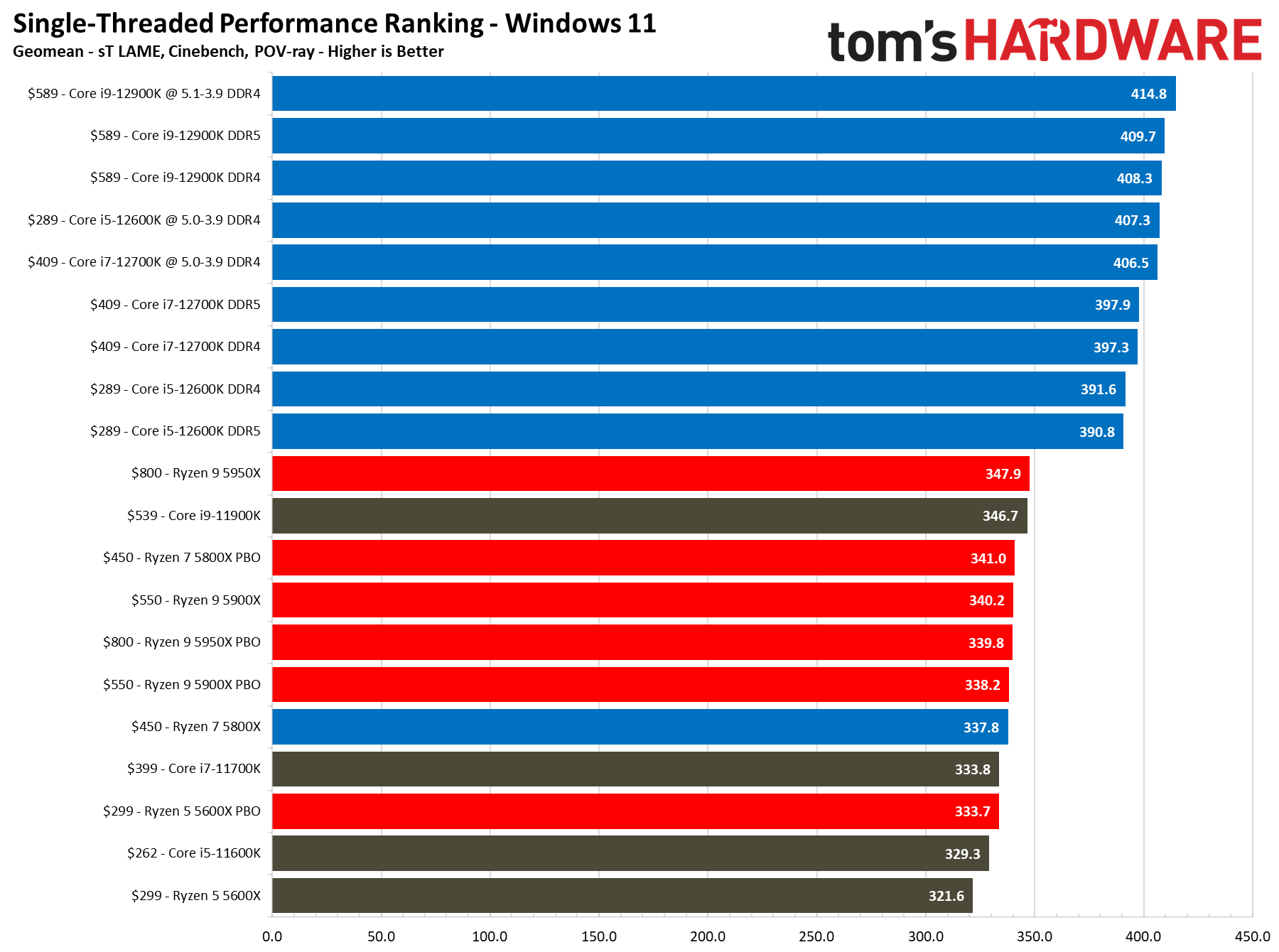
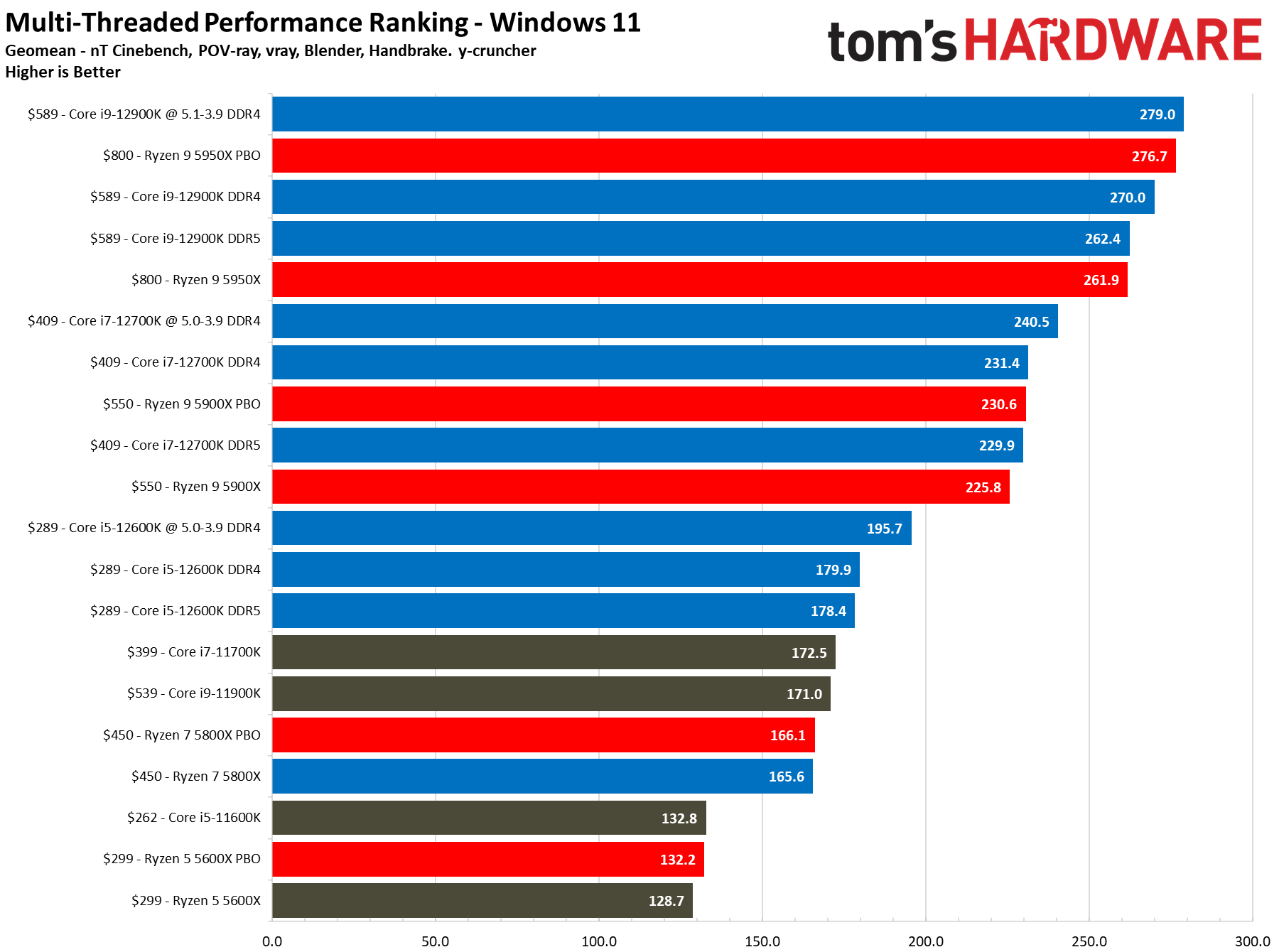
We can boil down productivity application performance into two broad categories: single- and multi-threaded. These slides show the geometric mean of performance in several of our most important tests in each category, but be sure to look at the expanded results below.
Given its more amenable $409 price tag, it is impressive to see the Core i7-12700K deliver a win over the $549 Ryzen 9 5900X in threaded work, highlighting the advantages of the x86 hybrid architecture. Taken as a cumulative measure, the 12-core 20-thread 12700K is 2.5% faster than the 12-core 24-thread 5900X, but be aware that this measurement only encompasses a selection of the threaded tests — you'll see a few wins for the 5900X in the individual benchmarks below. However, that's still a nice win for the 12700K — the performance-per-dollar ratio is strong.
As you'd expect given the 12700K's performance against the beastly Ryzen 9 5900X, it stretches its legs against the $390 Ryzen 7 5800X with a 40% performance advantage in threaded work.
The deltas in favor of Alder Lake are even more convincing in the single-threaded metric, with the 12700K being ~17% faster than both Ryzen contenders. As you'll see in the broader spate of lightly-threaded workloads below, Alder Lake dominates those types of workloads. The 12900K is the only chip on the market that can beat the 12700K in lightly-threaded work, albeit by a relatively slim 3% lead.
The generational uplift is impressive, too. The 12700K is 19% faster than the previous-gen 11700K in single-threaded work and 34% faster in threaded applications. Against the previous-gen flagship 11900K, the 12700K is 14% faster in lightly-threaded work and 35% faster in heavily-threaded tasks. That's an impressive gen-on-gen leap in performance and pricing, especially since Alder Lake arrived six short months after the prior-gen Rocket Lake chips.
The 12900K earns its price tag for serious productivity and prosumer tasks: The 12900K is ~17% faster in threaded work than the 12700K, and that percentage climbs in some workloads. The 12700K puts up strong results in applications with branchy code like LLVM compilation and the massively parallel molecular dynamics simulation code in NAMD, but these heavily-parallelized high-throughput applications respond very well to the E-cores, giving the 12900K an advantage.
Shifting gears to overclocking, the Core i7-12700K was 4.4% faster in lightly-threaded work and 3.9% faster in multi-threaded workloads. Notably, you'll see larger gains in individual applications below, while others only see a muted impact.
| Tom's Hardware - Application Benchmarks | Single-Threaded | Multi-Threaded |
| Core i9-12900K DDR4 | 100% | 100% |
| Core i9-12700K DDR4/5 | ~97.1% | ~85.2% |
| Ryzen 9 5900X | 83.0% | 83.6% |
| Ryzen 7 5800X | 82.5% | 61.33% |
Rendering Benchmarks on Core i7-12700K
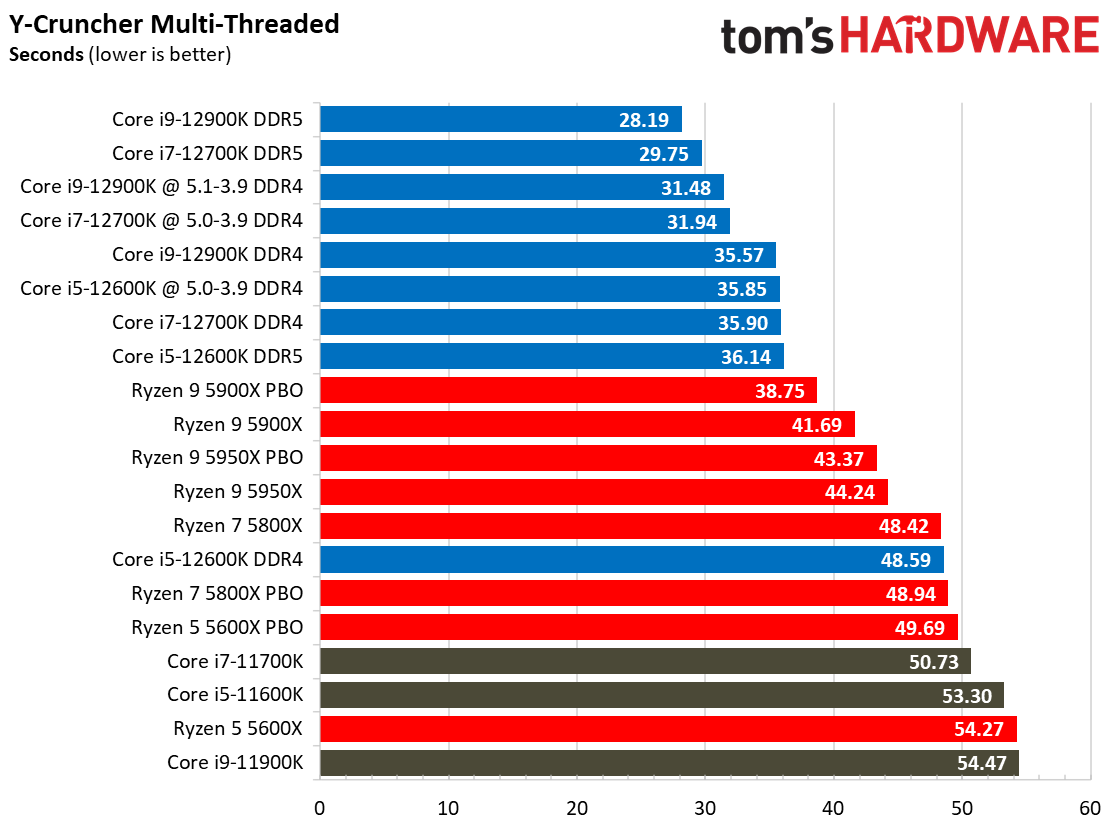
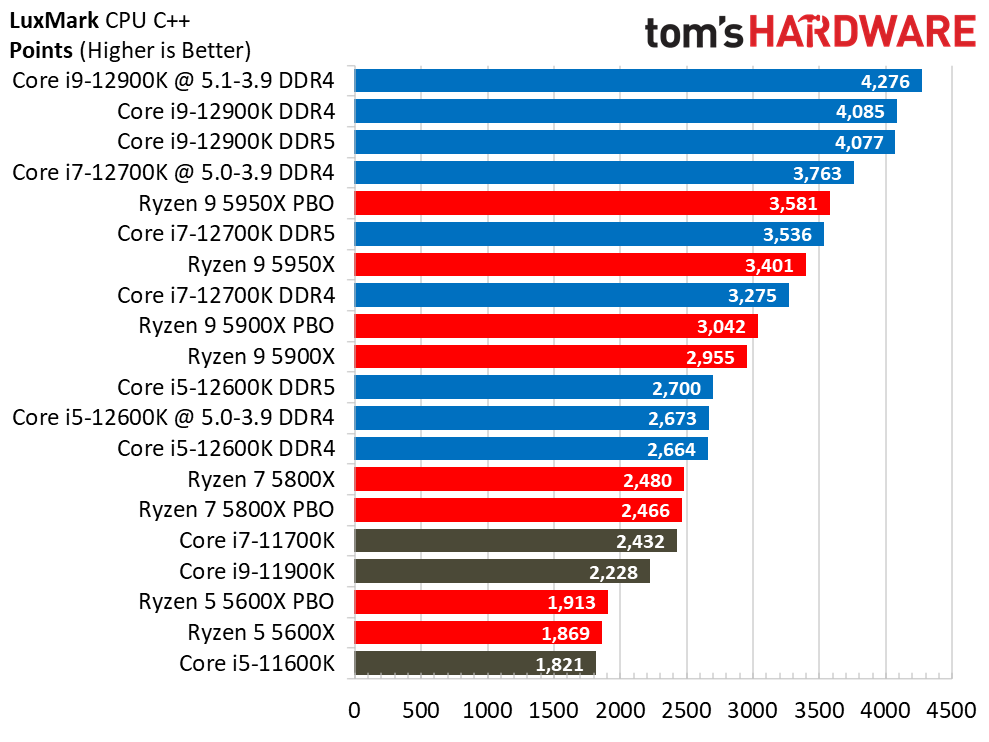
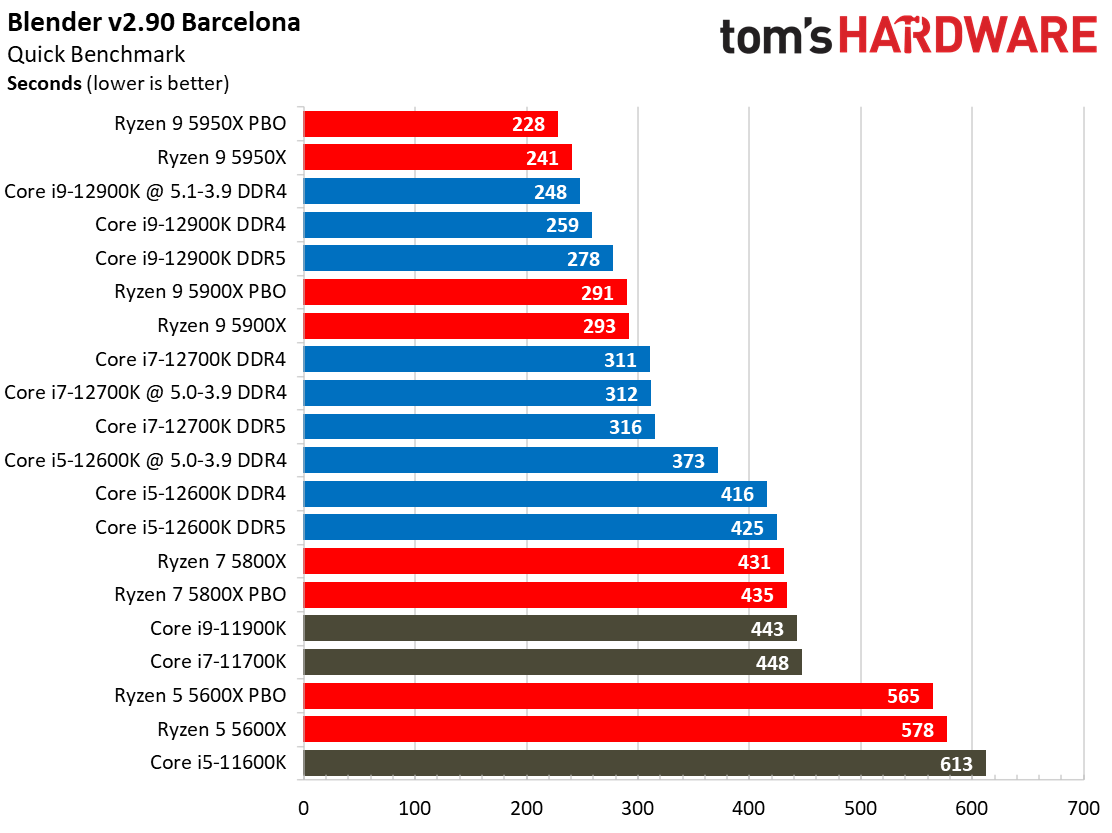
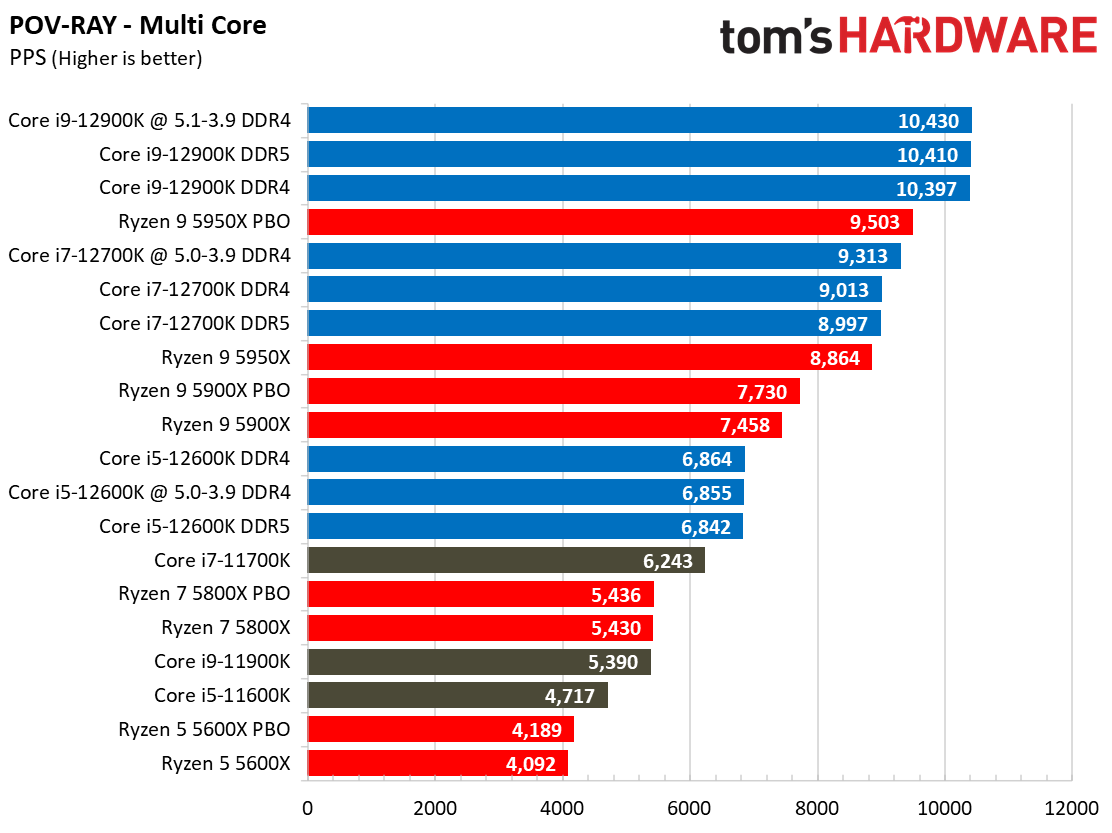
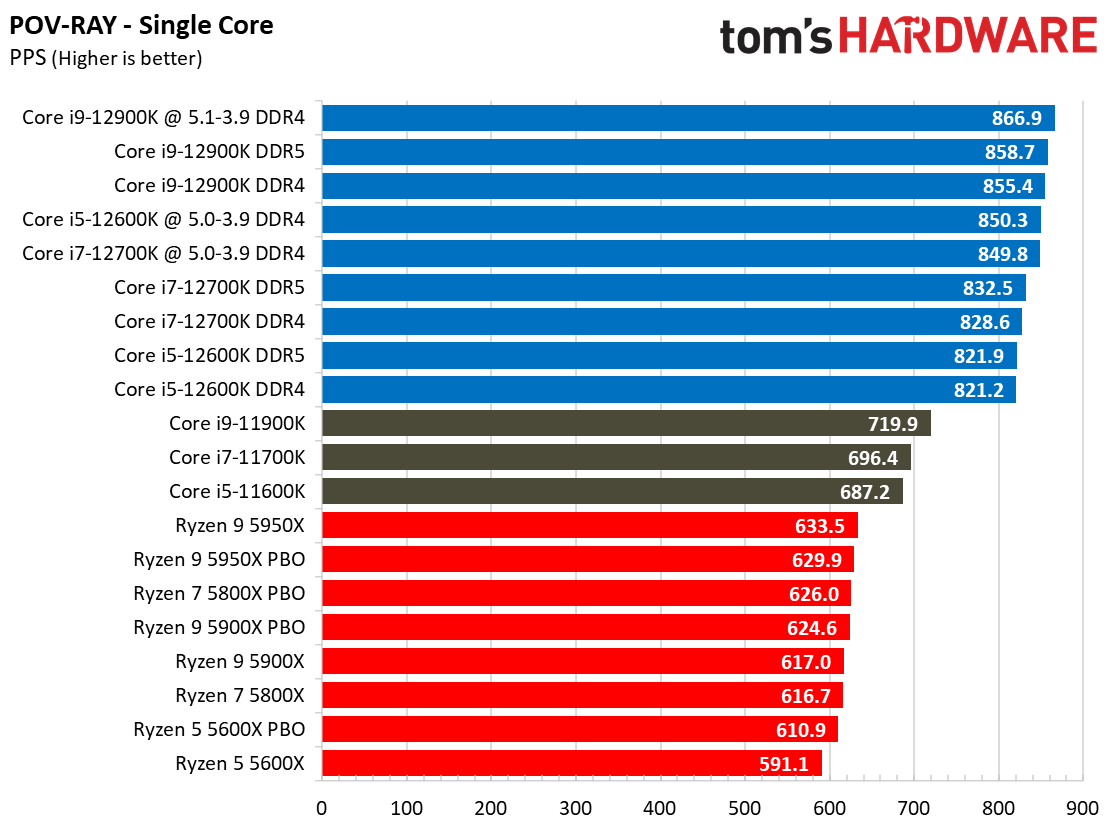
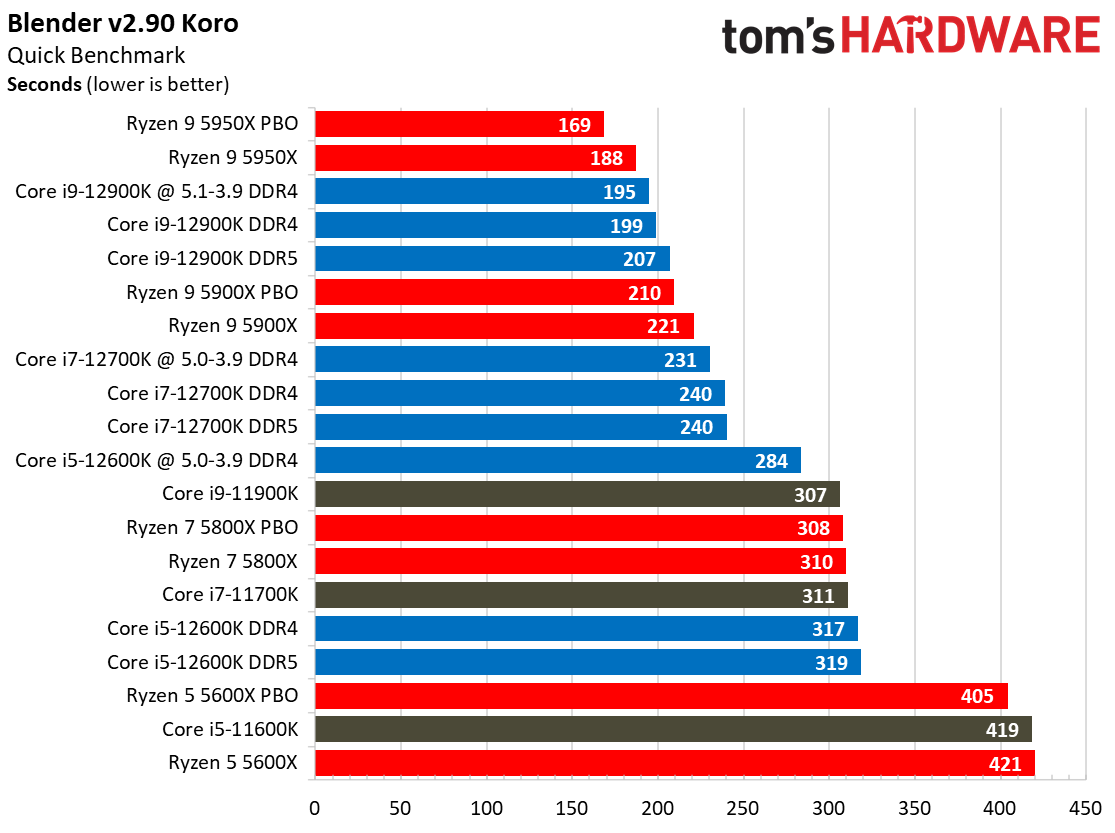
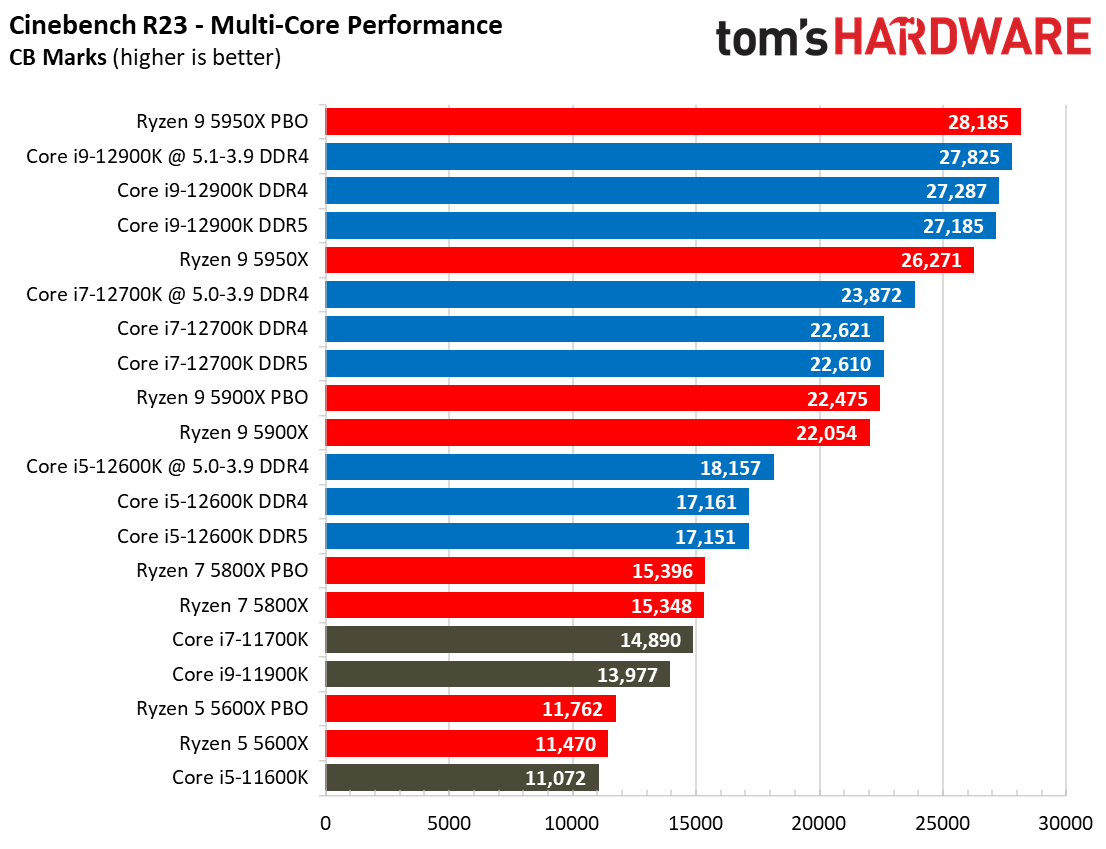
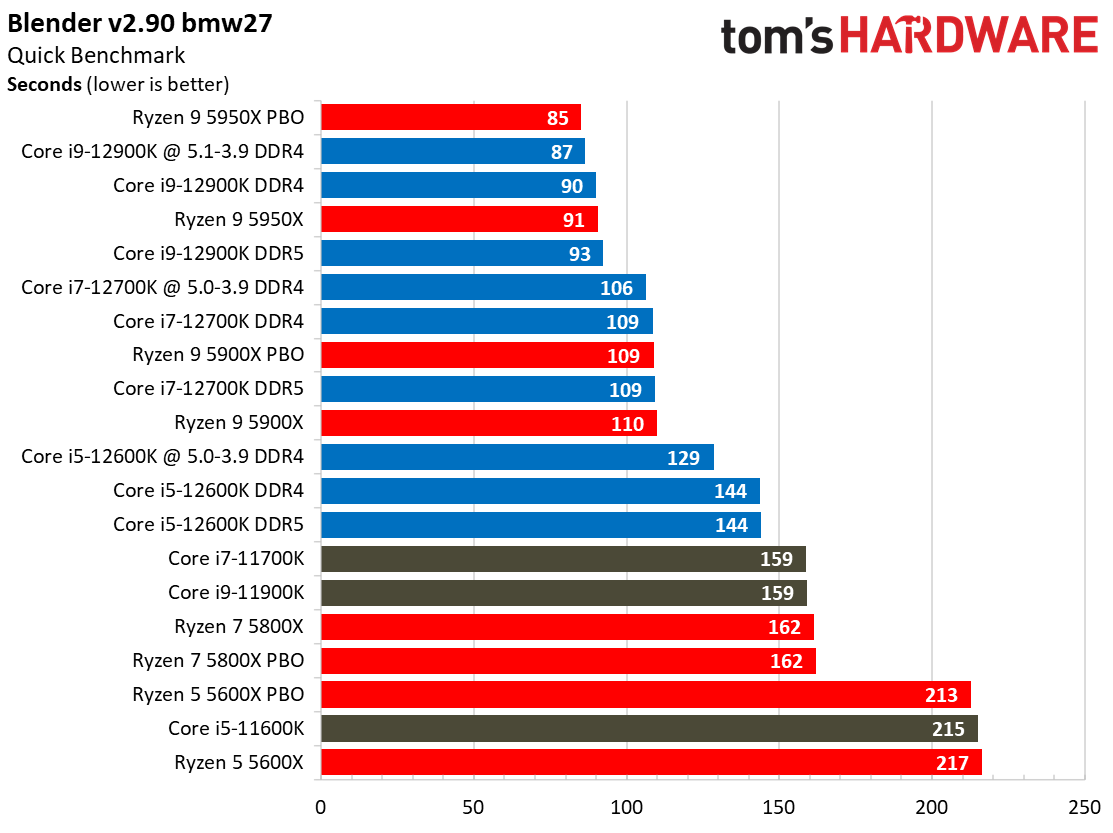
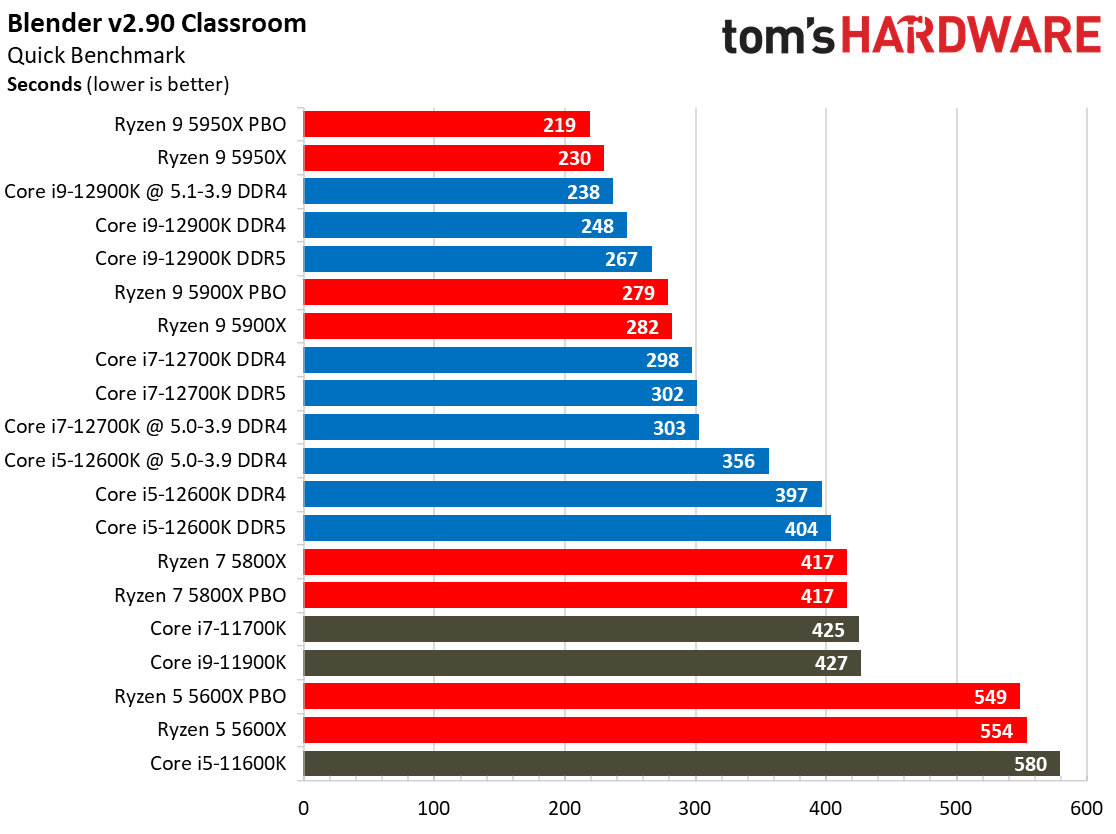
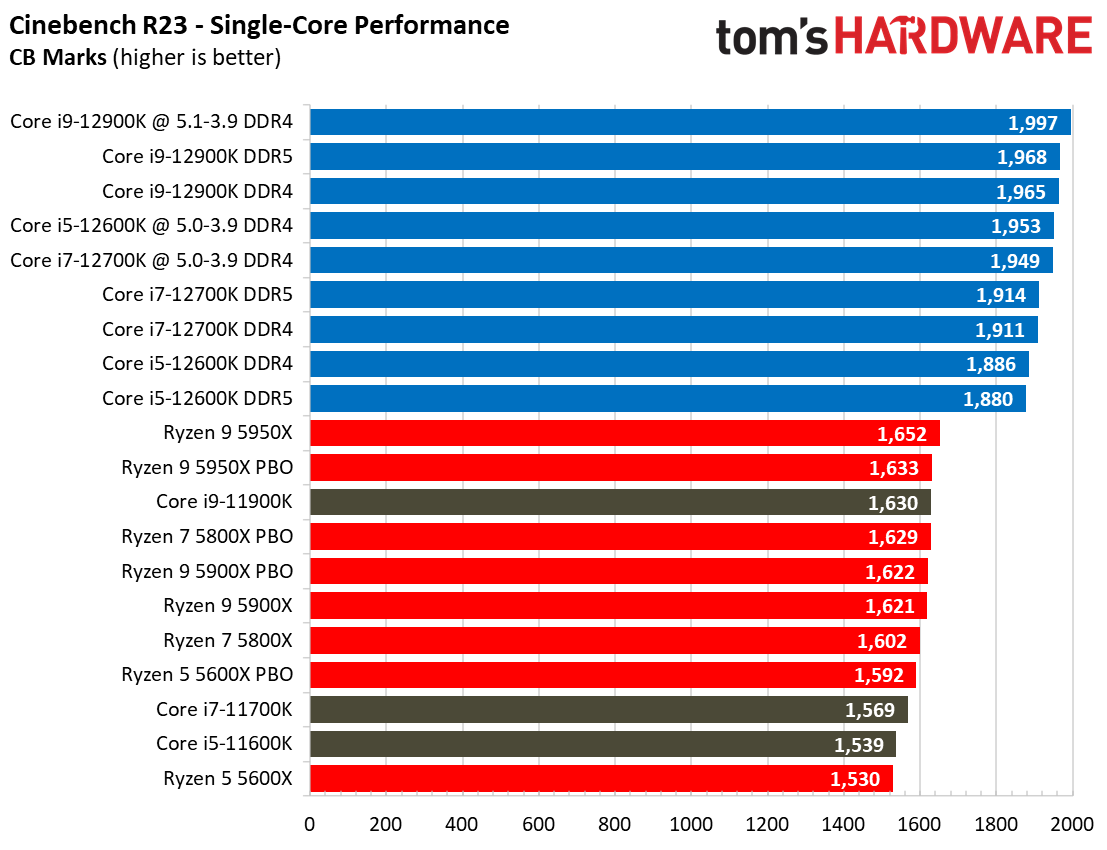
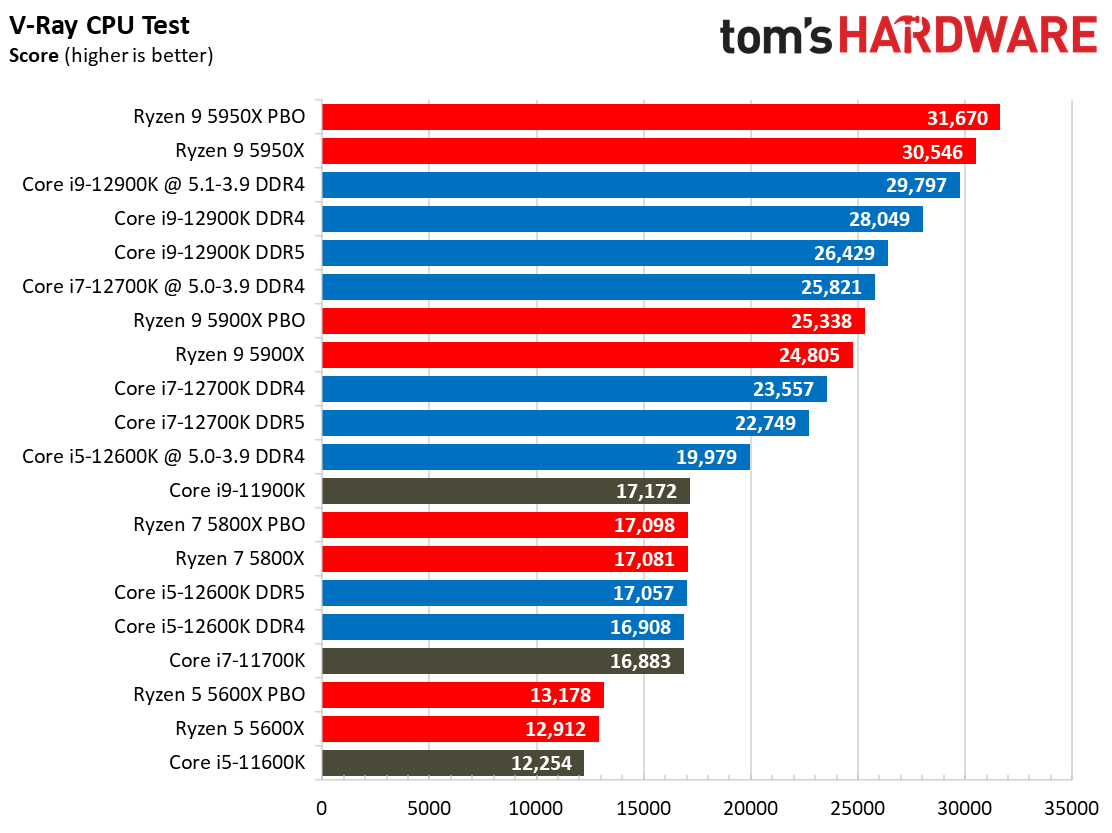
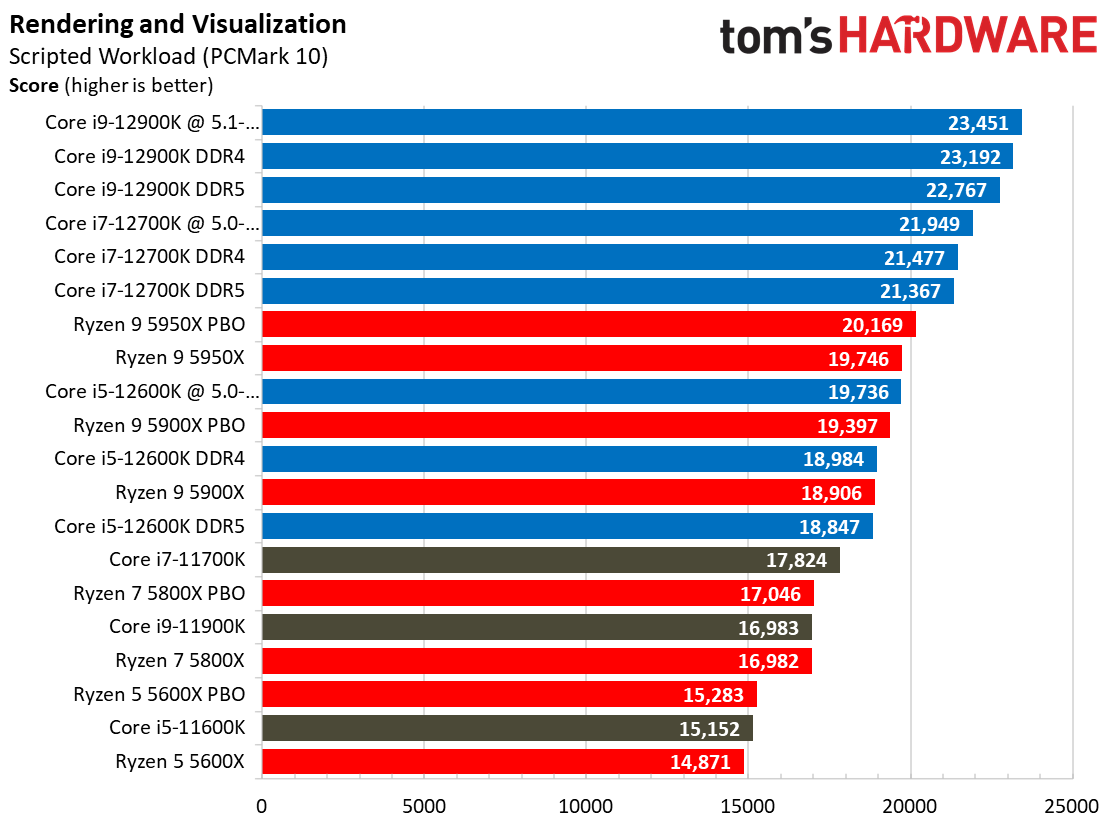
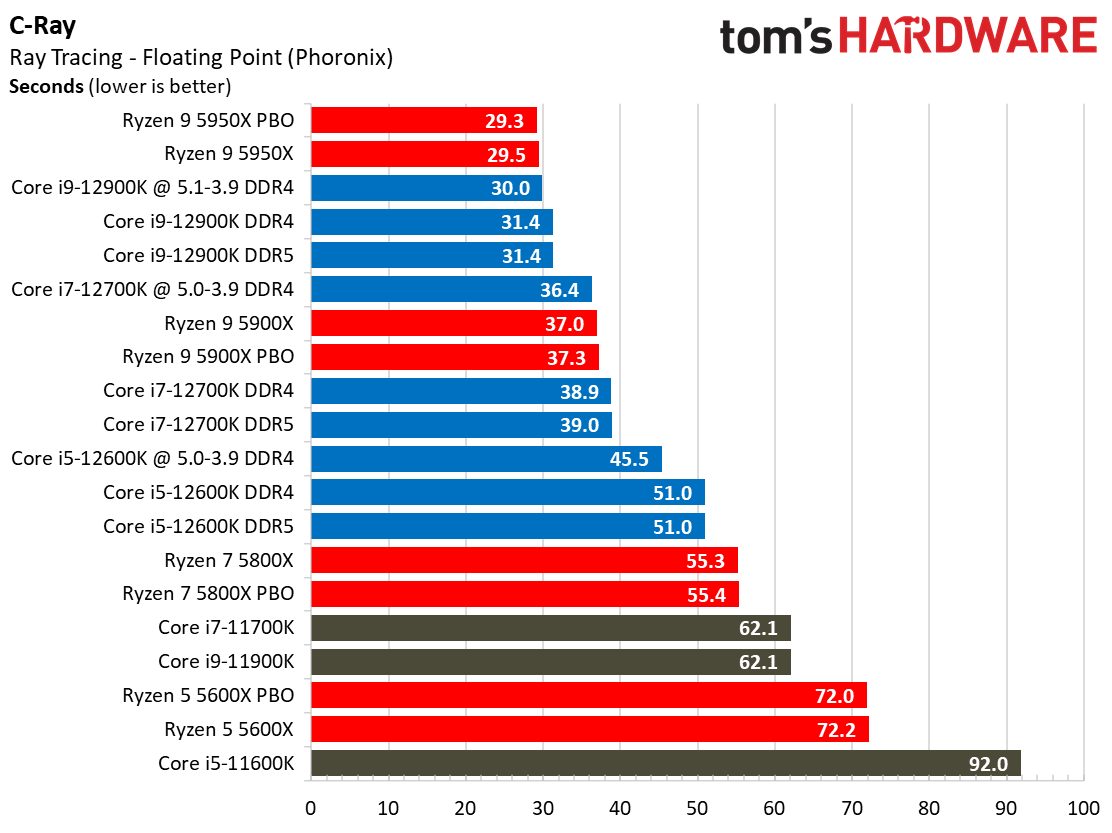
Here we can see the 12-core 20-thread 12700K battle with the Ryzen 9 5900X in a series of rendering workloads that used to result in decisive wins for AMD's stable.
That story is quite a bit different now. The Core i7-12700K is 2.6% faster than the Ryzen 9 5900X in the threaded Cinebench test and 20.8% faster in POV-Ray, highlighting the surprising performance packed into the incredibly small E-cores. The 5900X takes the lead in a few of the other threaded applications, with an 11% lead in the Corona benchmark and a strong showing throughout the various Blender renders.
The 12700K leads the entire Ryzen lineup in the single-threaded rendering benchmarks, showing that the Thread Director places those tasks perfectly onto the faster P-cores.
Get Tom's Hardware's best news and in-depth reviews, straight to your inbox.
Encoding Benchmarks on Core i7-12700K
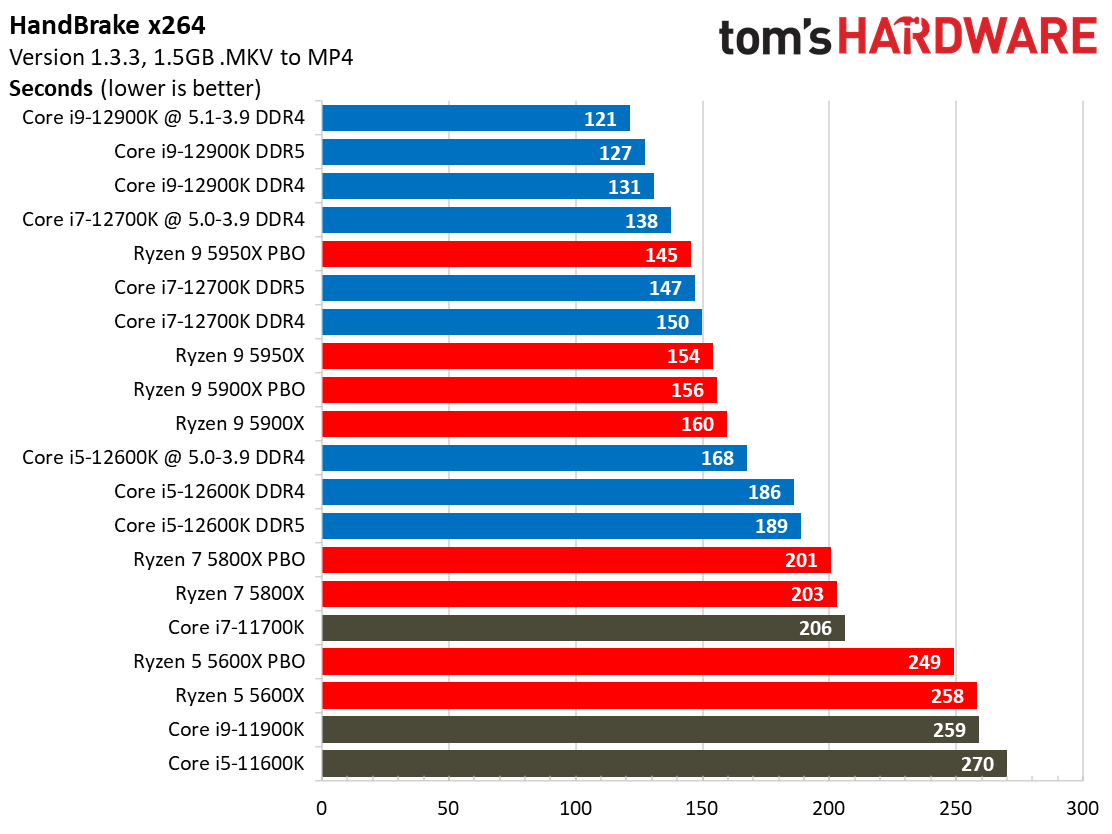
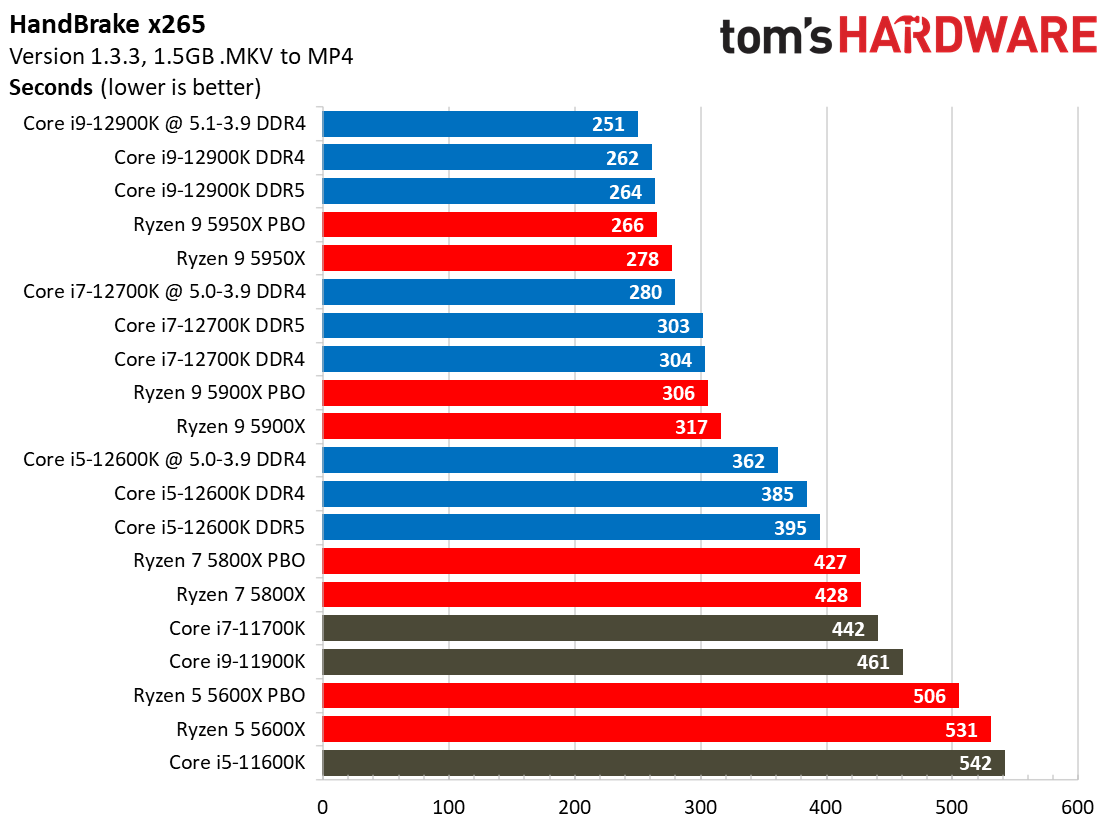
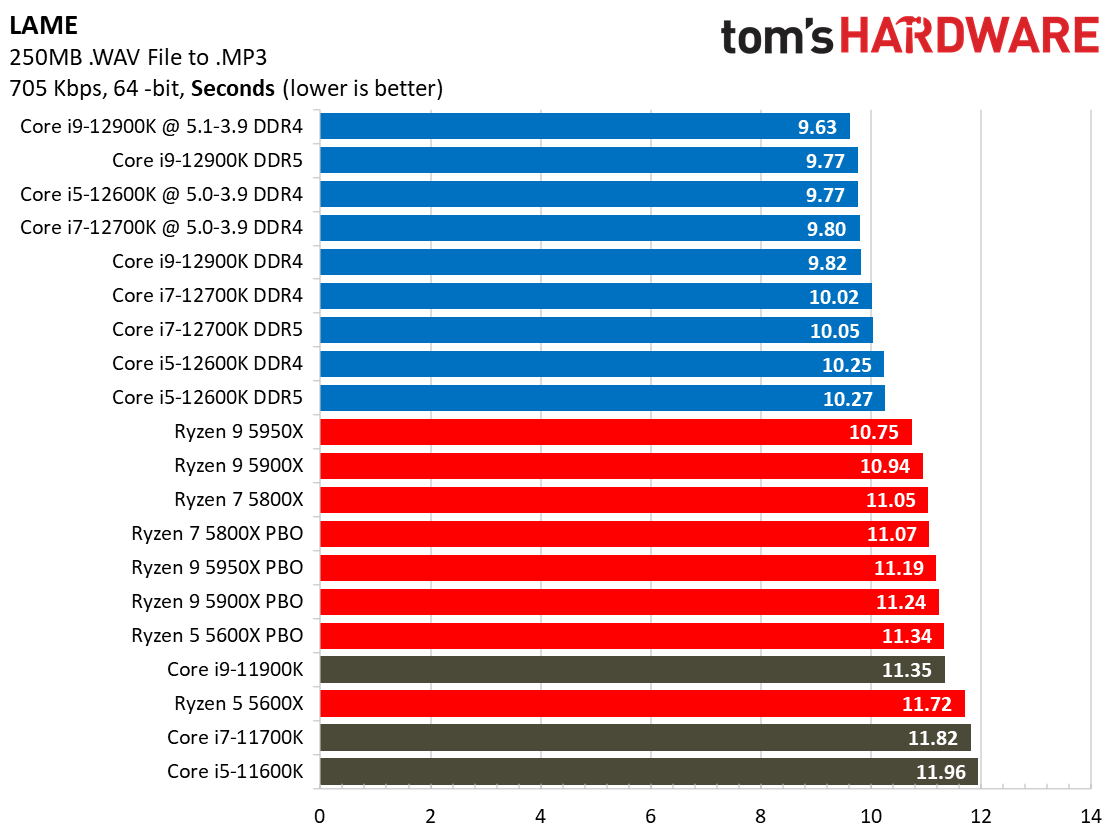
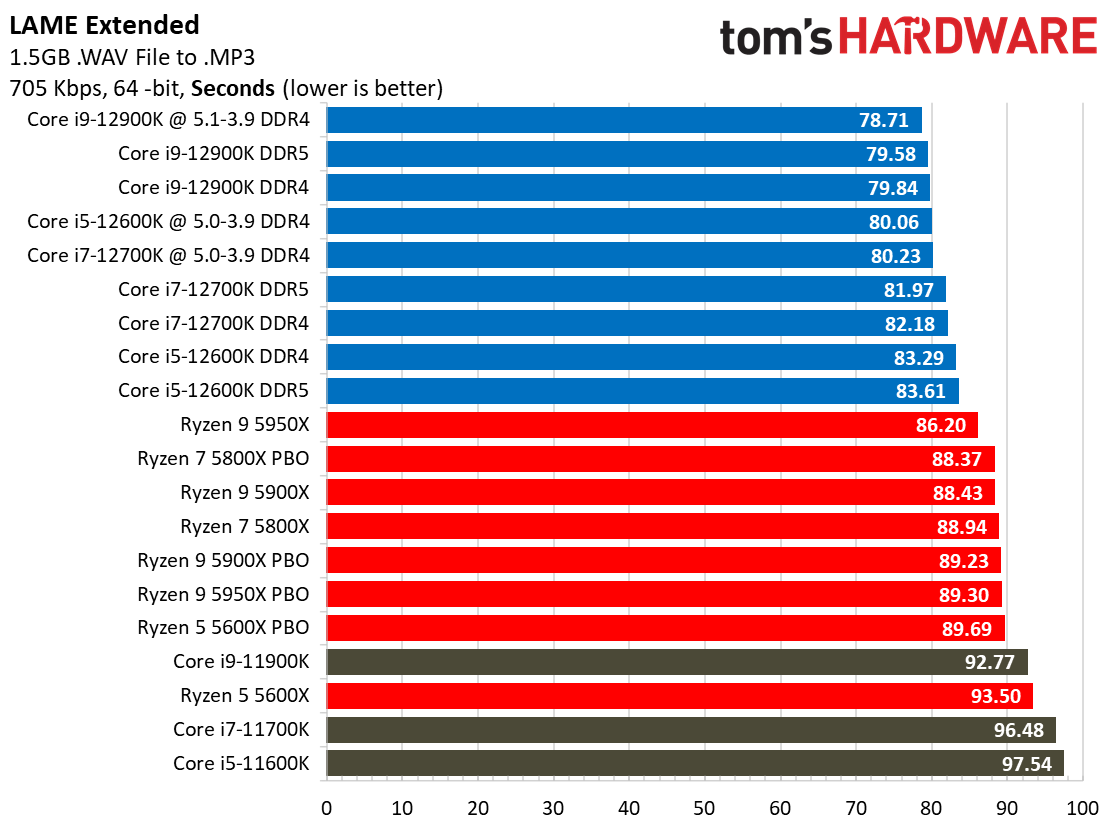
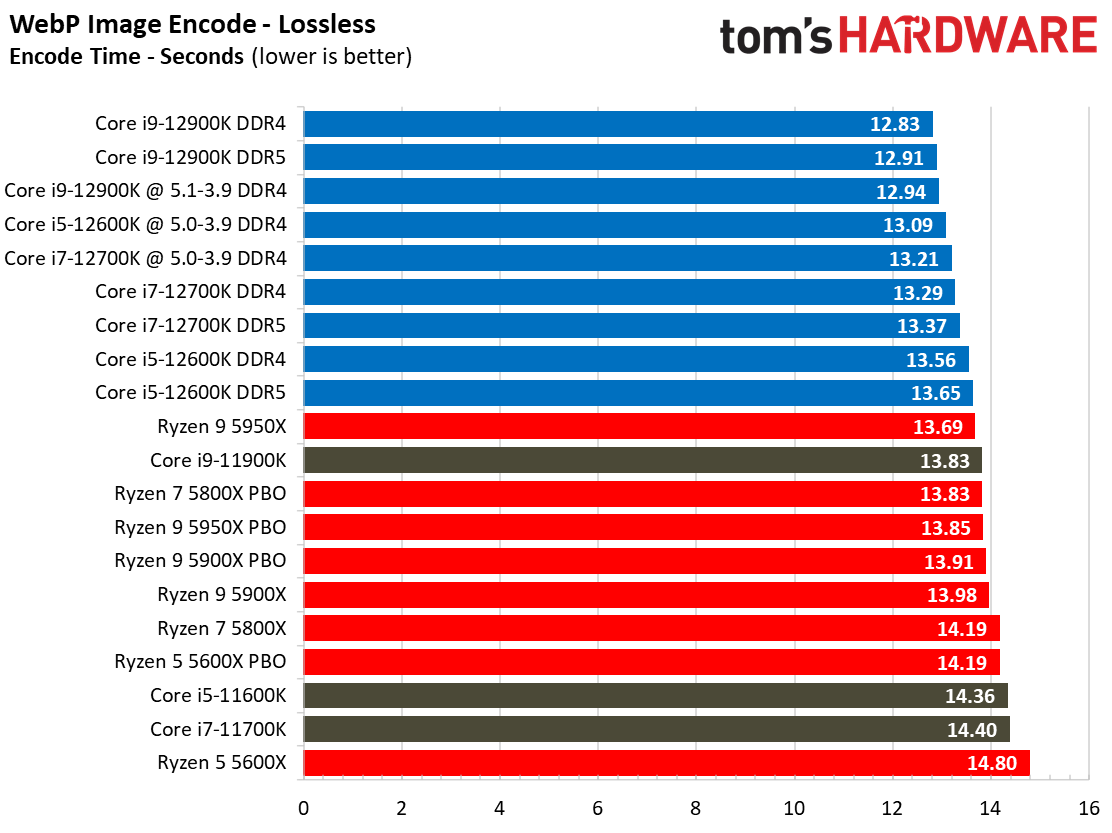
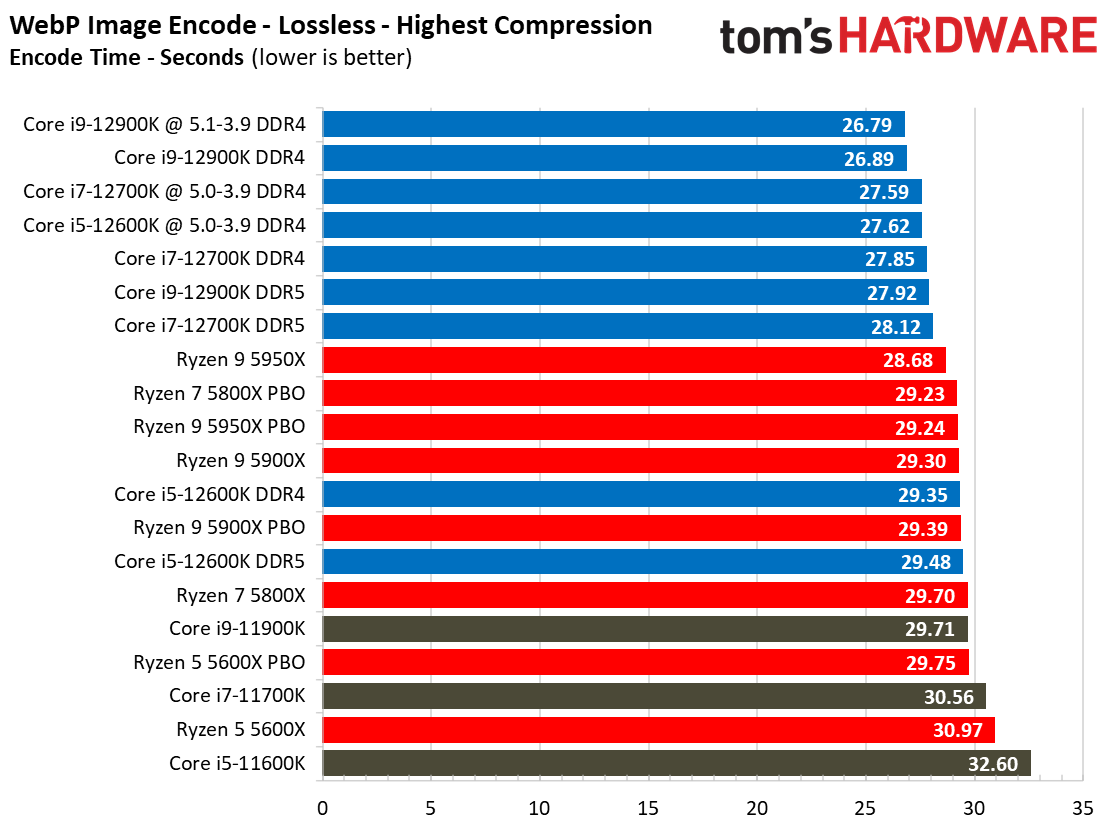
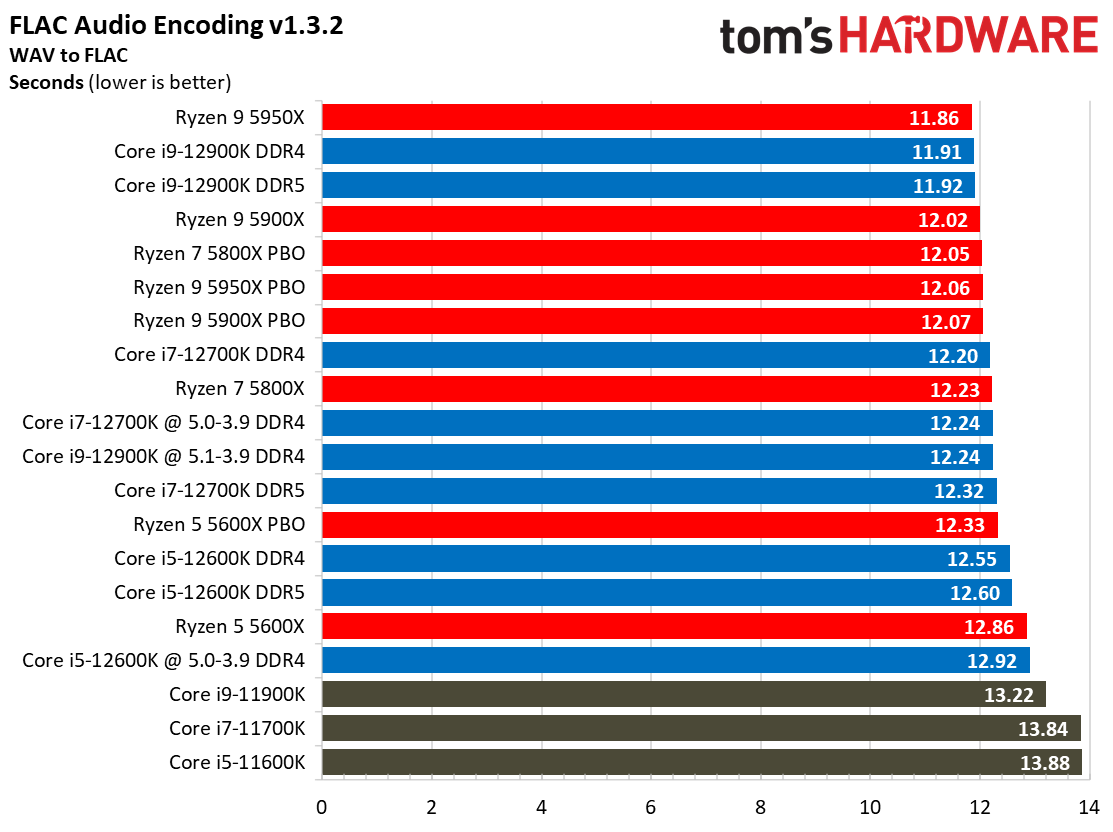
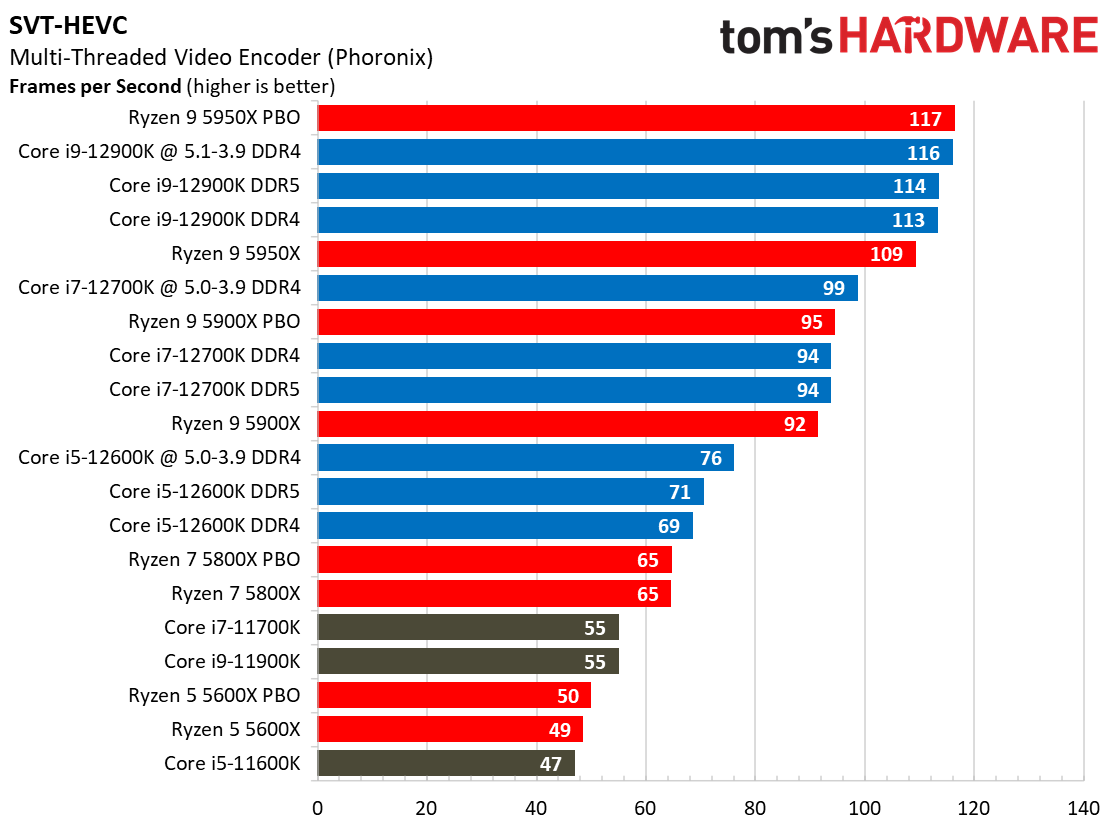
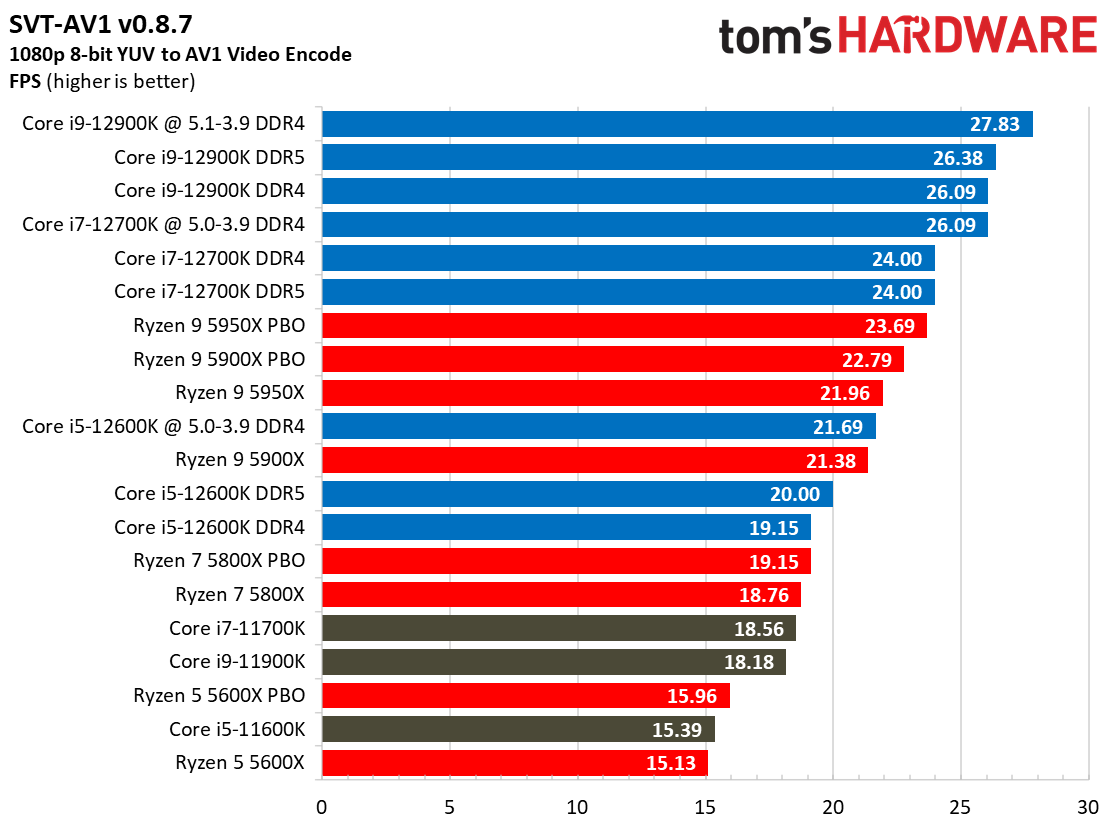
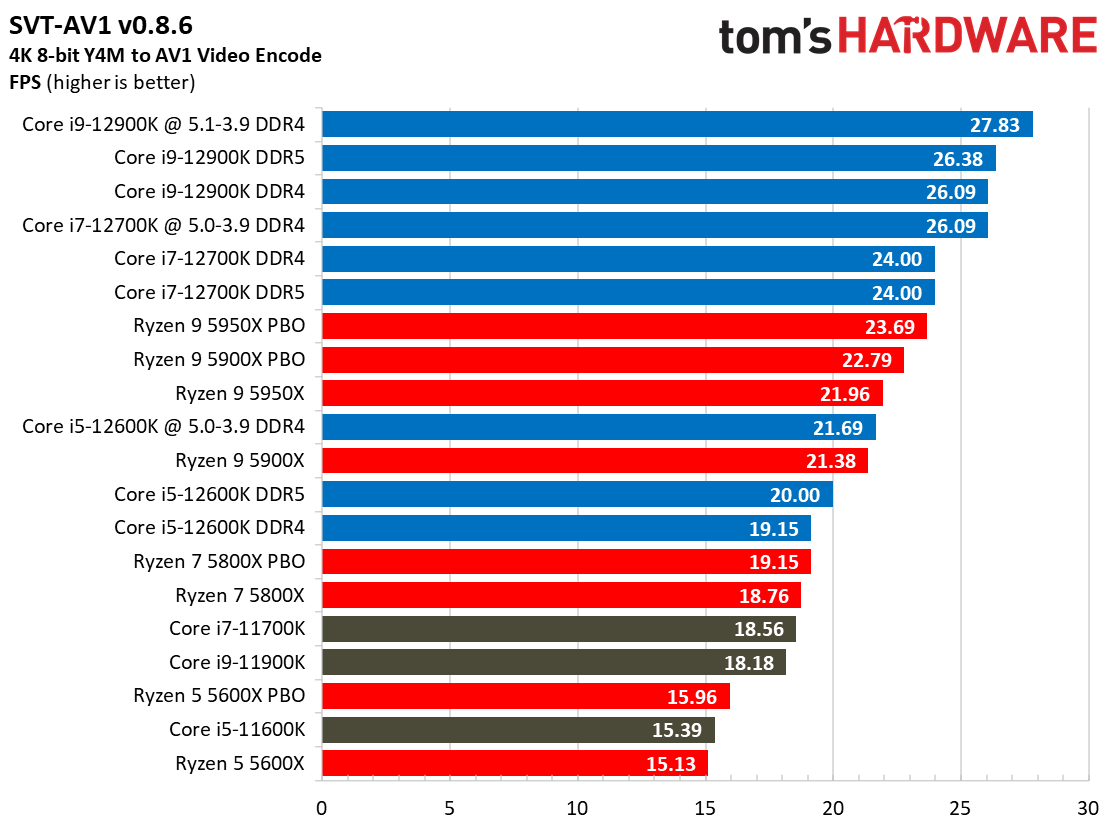
We ran into issues with Handbrake x264 in Windows 10 because it is coded to deprioritize its threads, but here we can see that Thread Director works in tandem with the Windows 11 scheduler to rectify the issue, allowing the Core i7-11700K to take the lead.
Overall, the Core i7-12700K dominates encoding workloads, be they lightly- or multi-threaded, with only one slightly trailing result in the FLAC benchmark, but we consider that close enough to be a tie.
Web Browsing on Intel Core i7-12700K
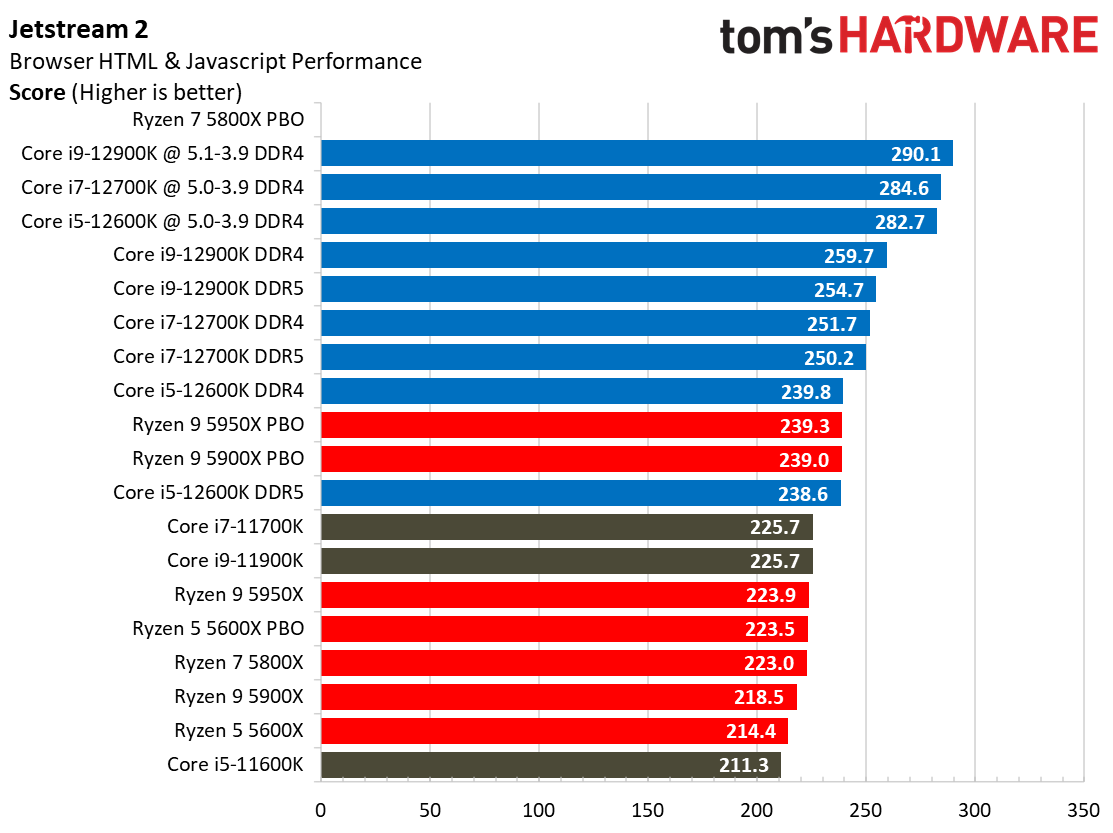
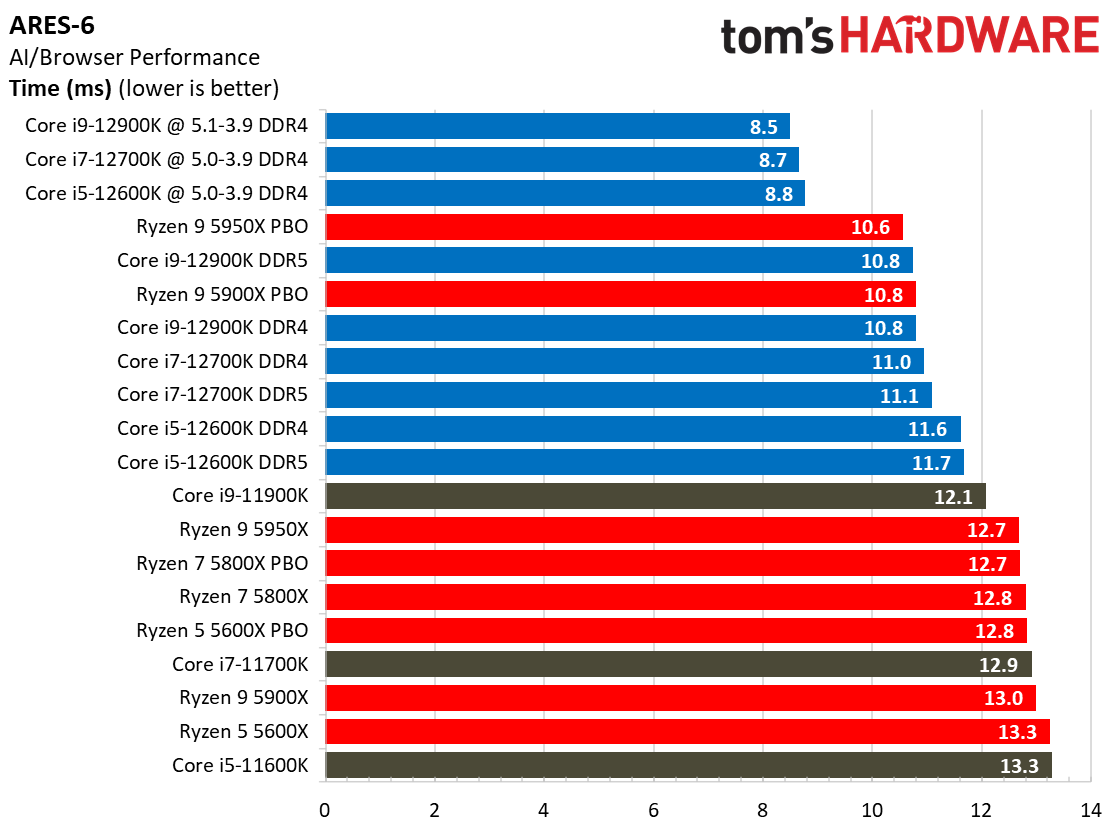
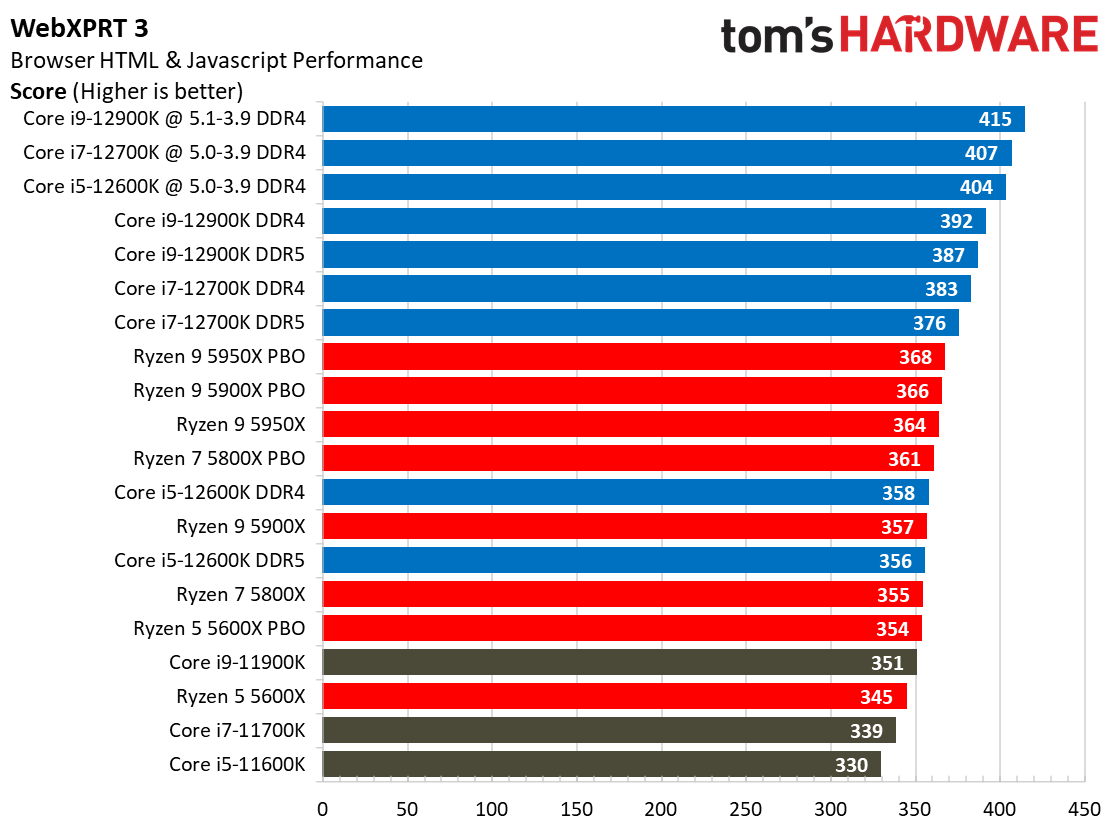
The ubiquitous web browser is one of the most frequently used applications. These tests tend to be lightly-threaded, so a snappy response time is critical. As an extra challenge for Alder Lake, placing these bursty and latency-sensitive workloads directly onto the P-cores requires an ultra-snappy response time from both the Thread Director and the Windows scheduler. That tandem obviously works extremely well as the Core i7-12700K dominates these benchmarks.
This leads us to the Microsoft Edge browser: This test is our lone example of a browser that benefits from threaded horsepower. Here we can see that the 12700K takes another easy win, proving it is quite versatile in browser work.
Adobe Premiere Pro, Photoshop, and Lightroom on Core i7-12700K
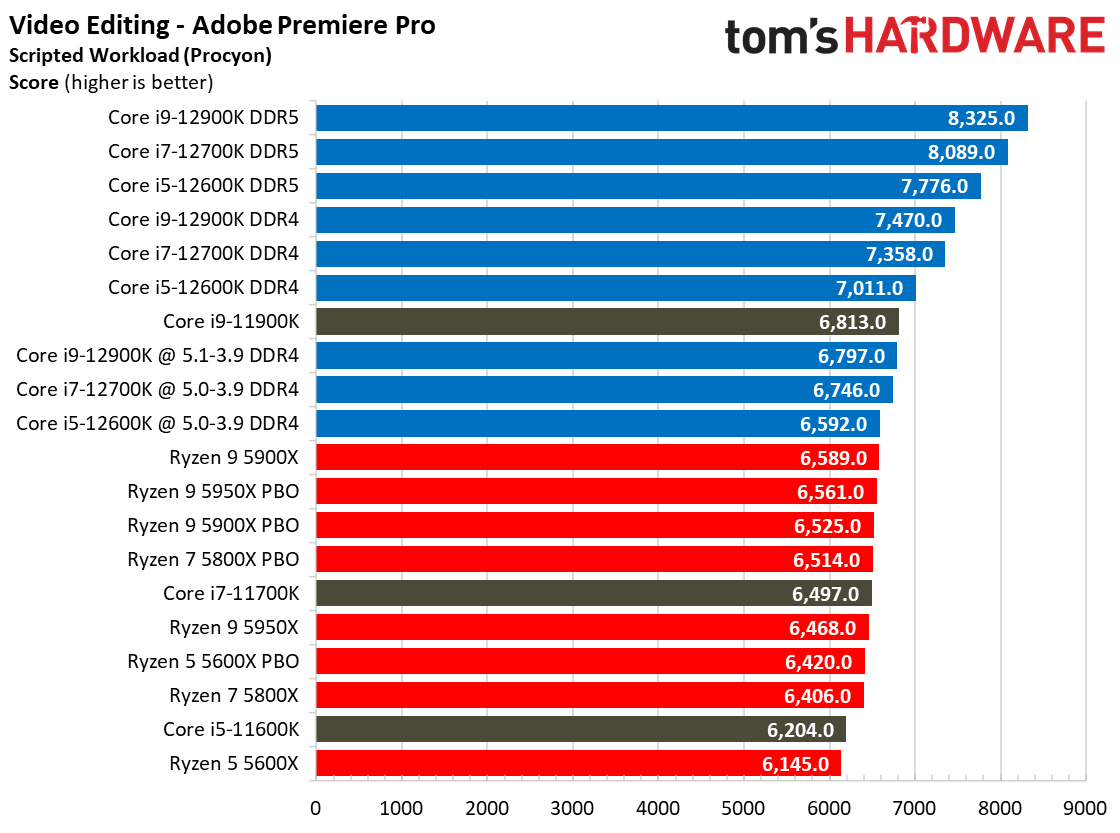
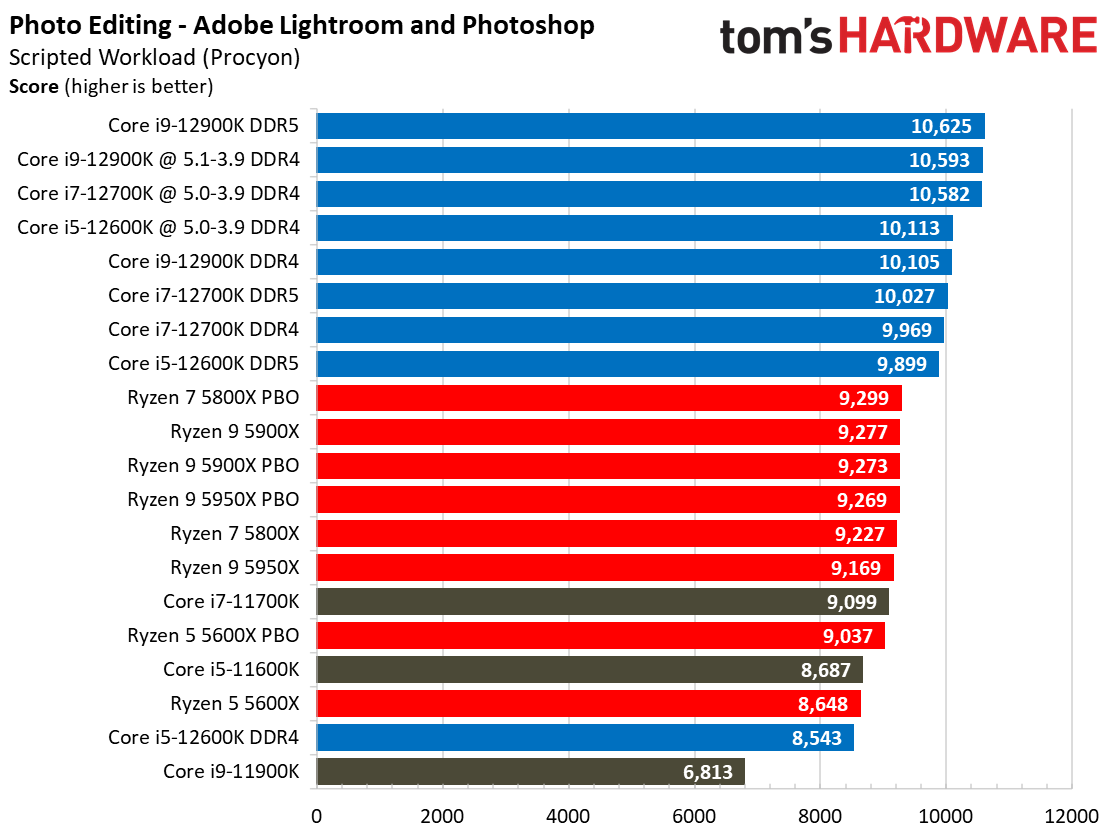
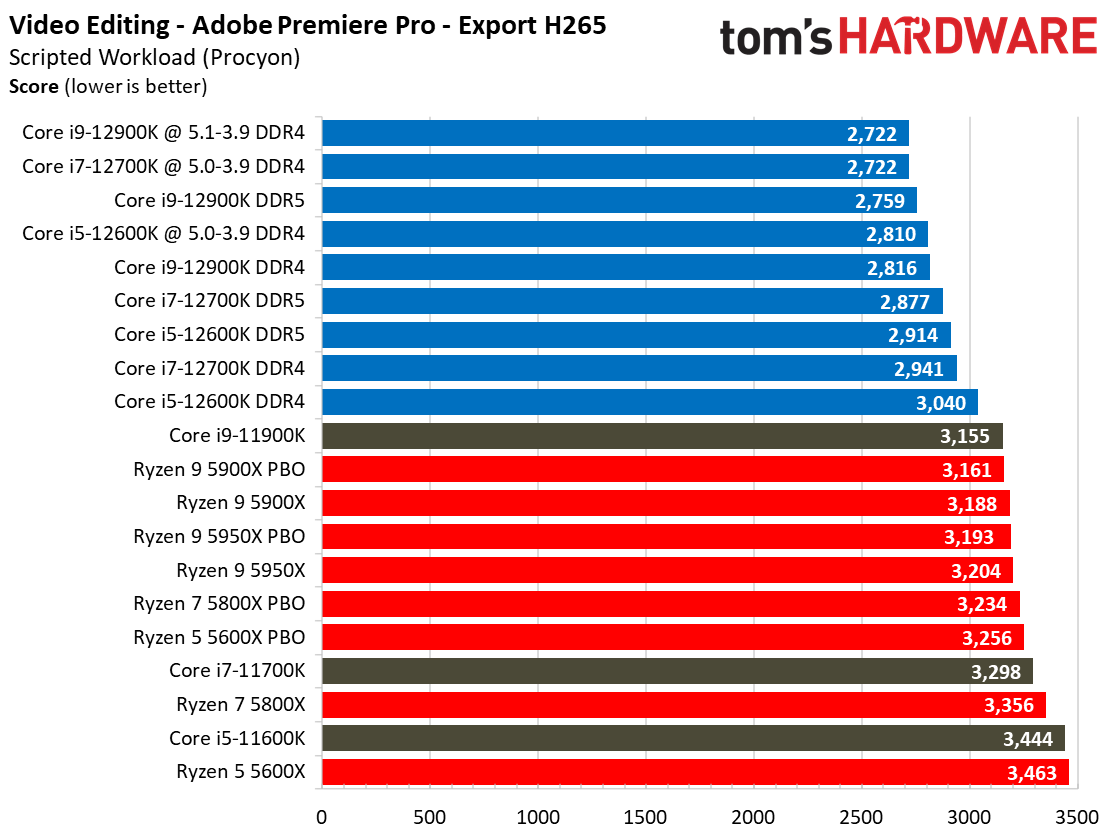
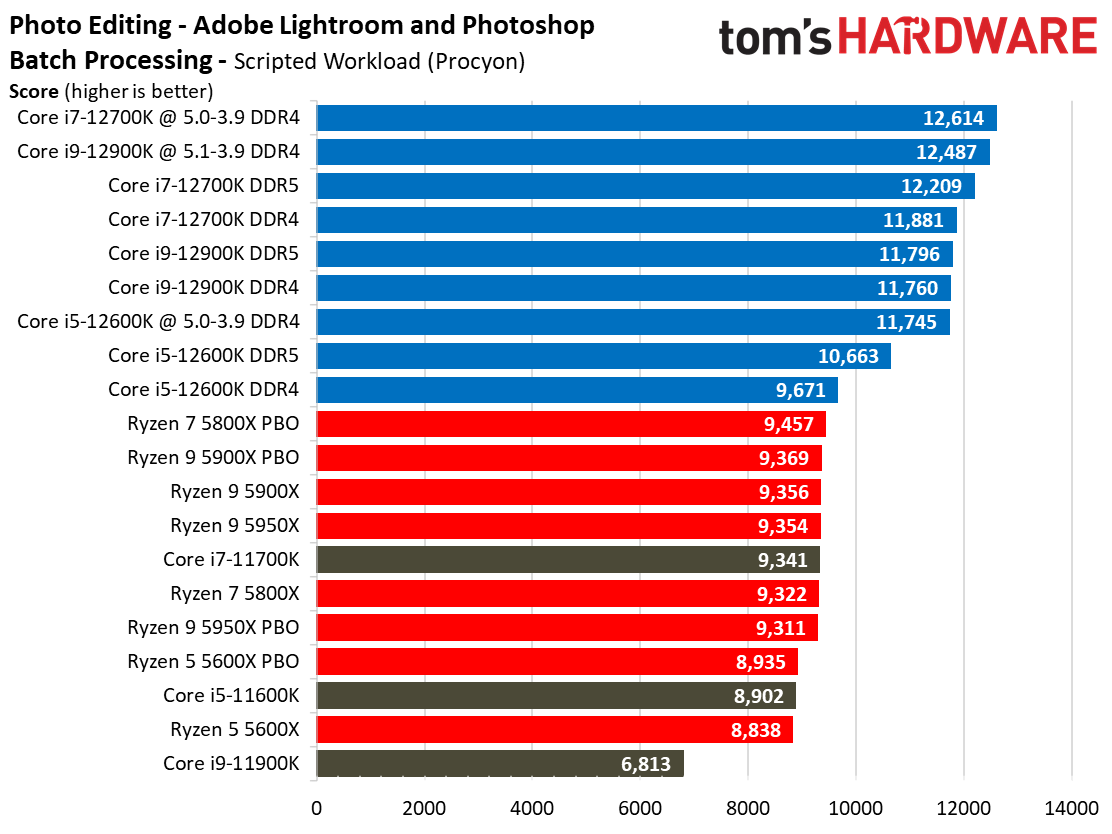
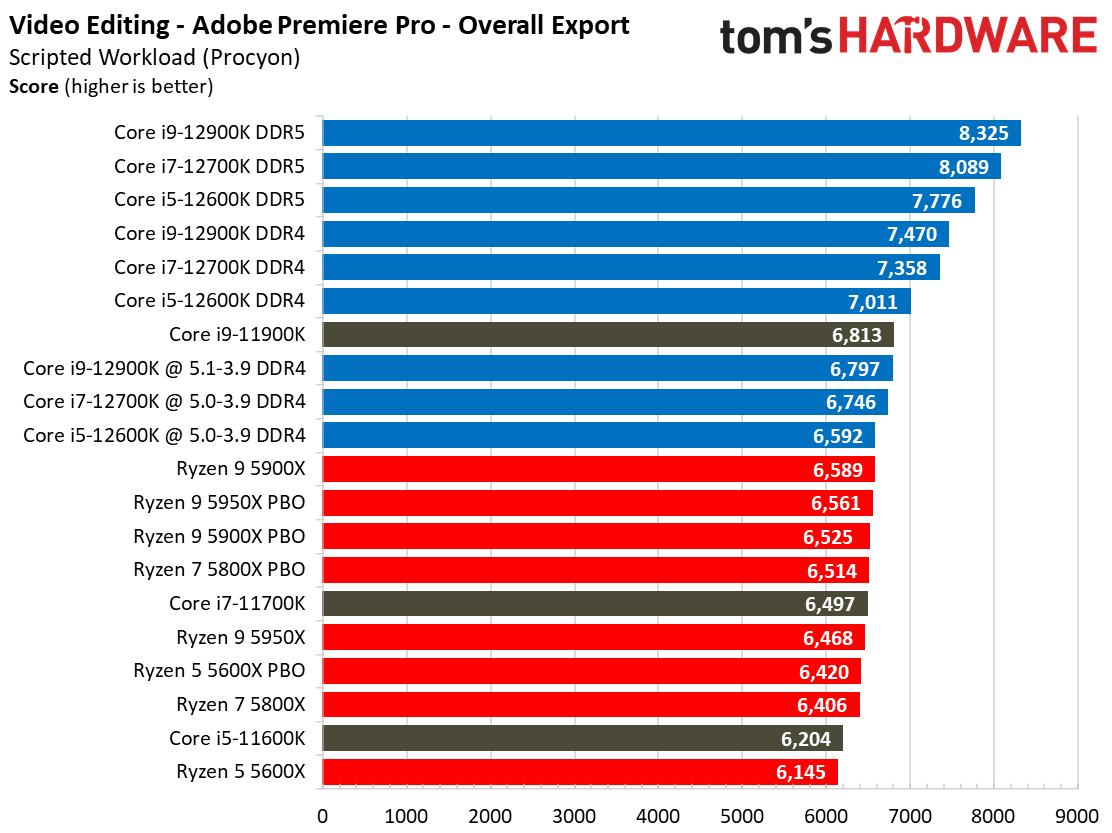
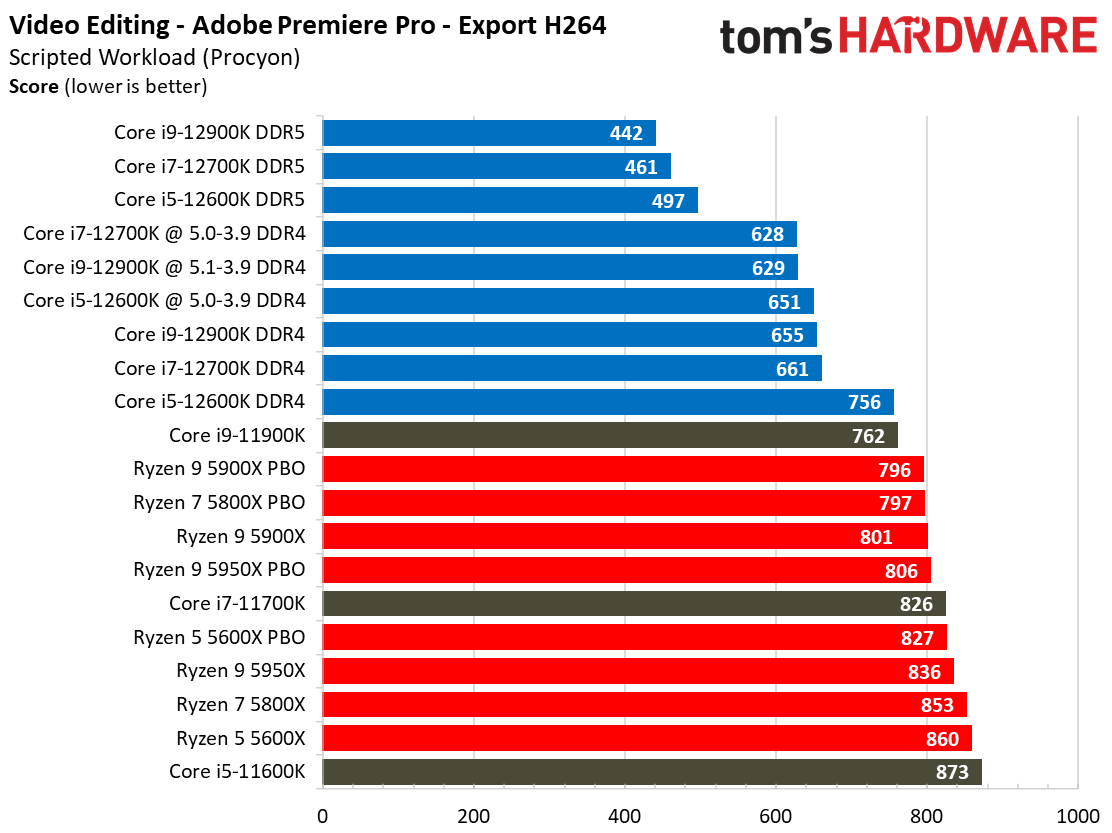
We've integrated the UL Benchmarks Procyon tests into our suite to replace the aging PCMark 10. This new benchmark runs complex Adobe Premiere Pro, Photoshop, and Lightroom workflows with the actual software, making for a great real-world test suite.
Here we can see that Adobe's Premiere Pro clearly prizes the increased memory throughput from DDR5. For example, in the Adobe Premiere Pro video editing workload, the Core i7-12700K leads the Ryzen 9 5900X by 11.7% with DDR4 but is 22.8% faster with DDR5 memory.
We don't see the same trend in the Adobe Lightroom/Photoshop overall score — the Core i7-12700K leads by ~8% with both DDR4 and DDR5, showing little impact in the overall score from faster memory throughput.
Office and Productivity on Core i7-12700K
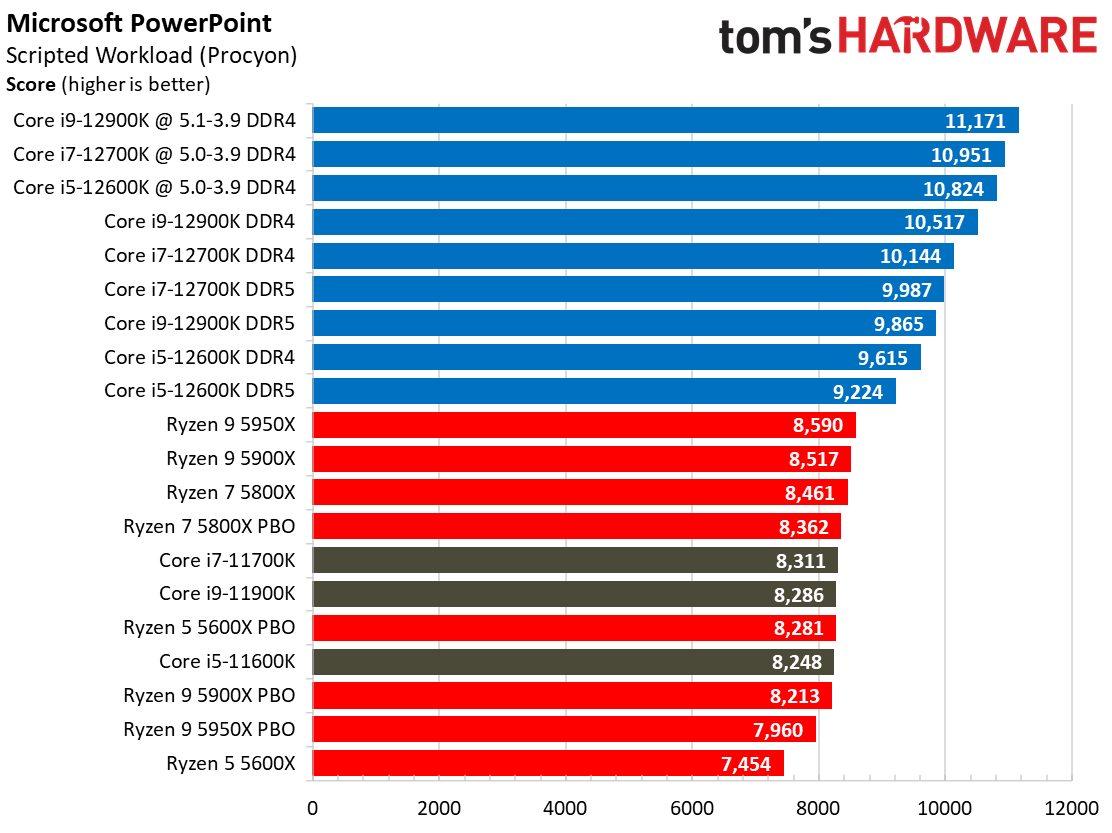
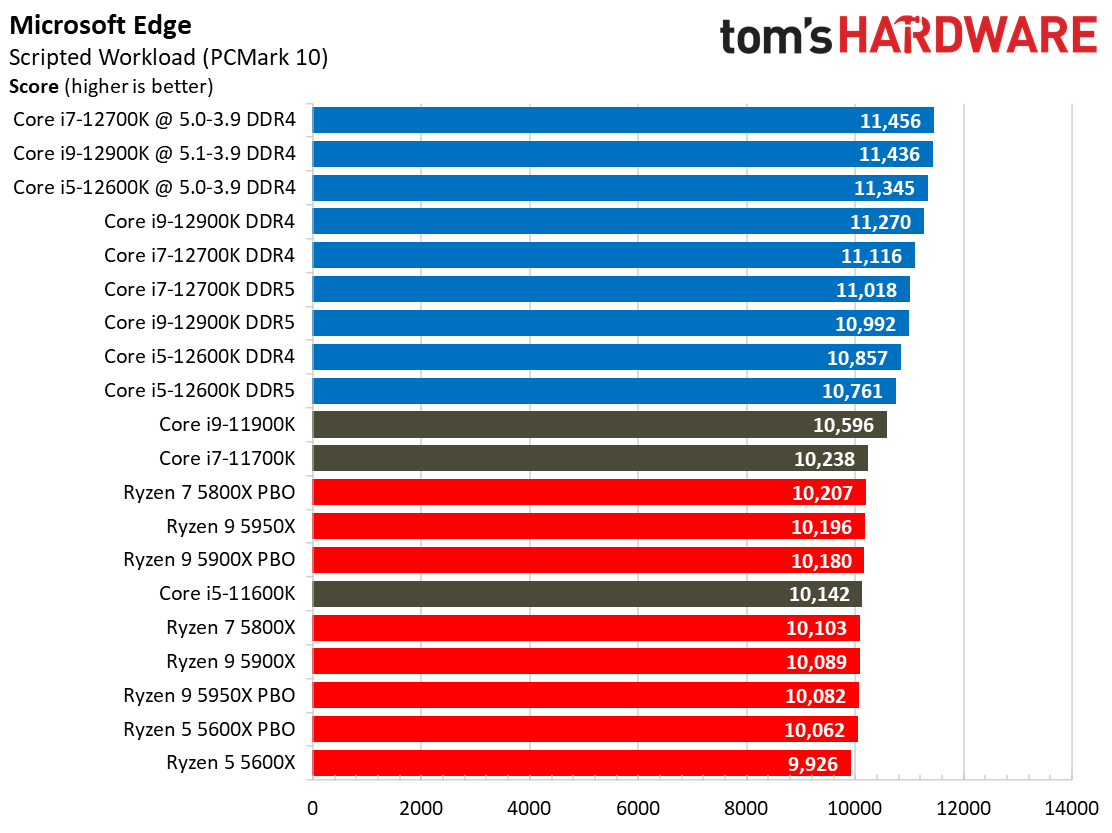
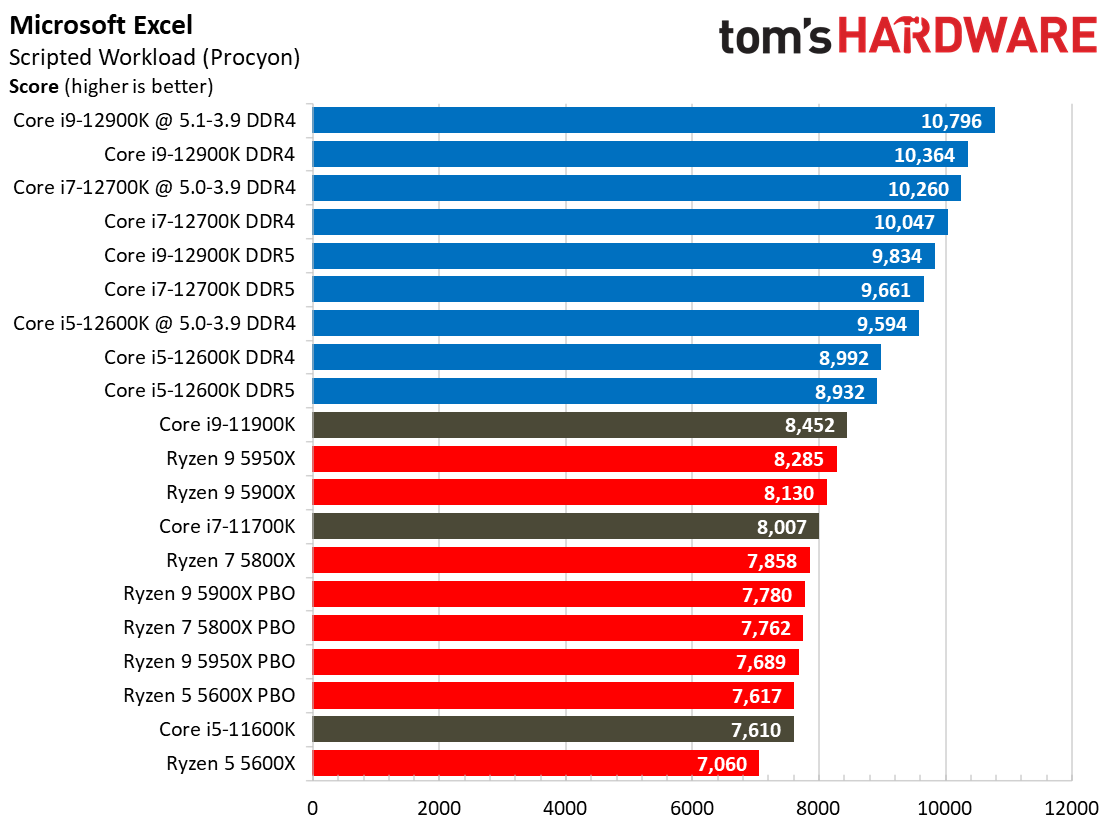
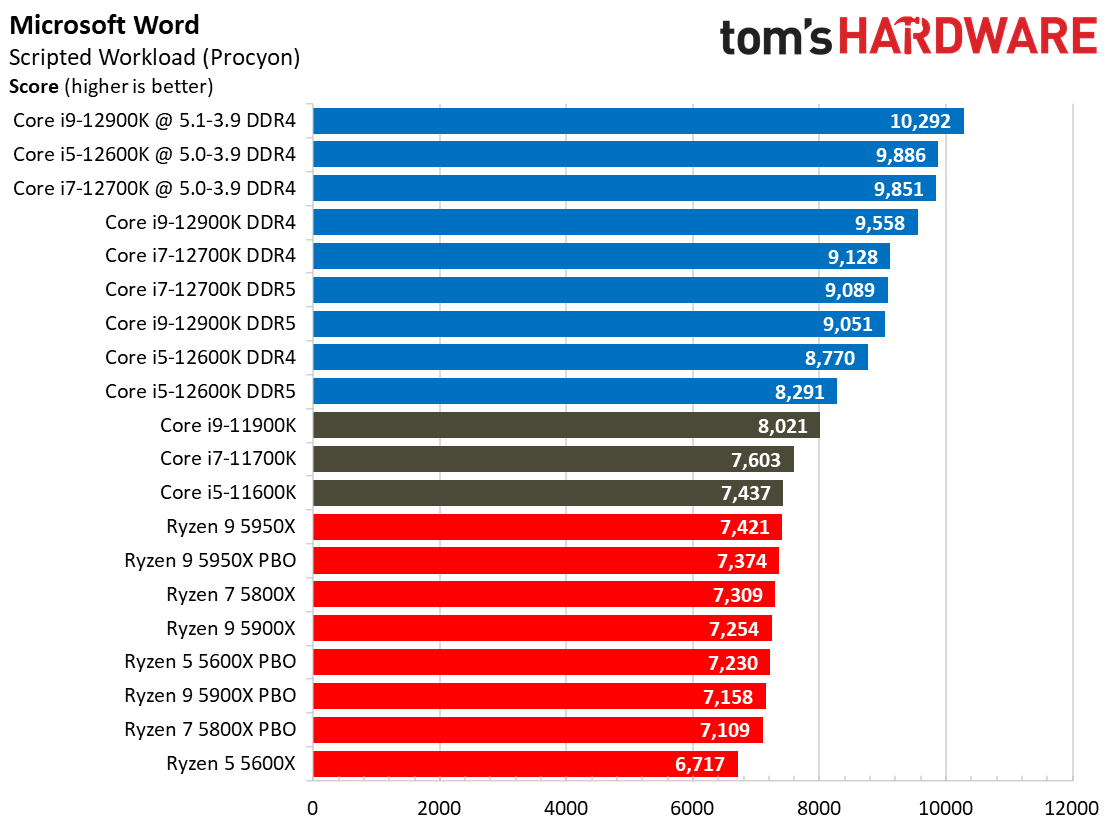
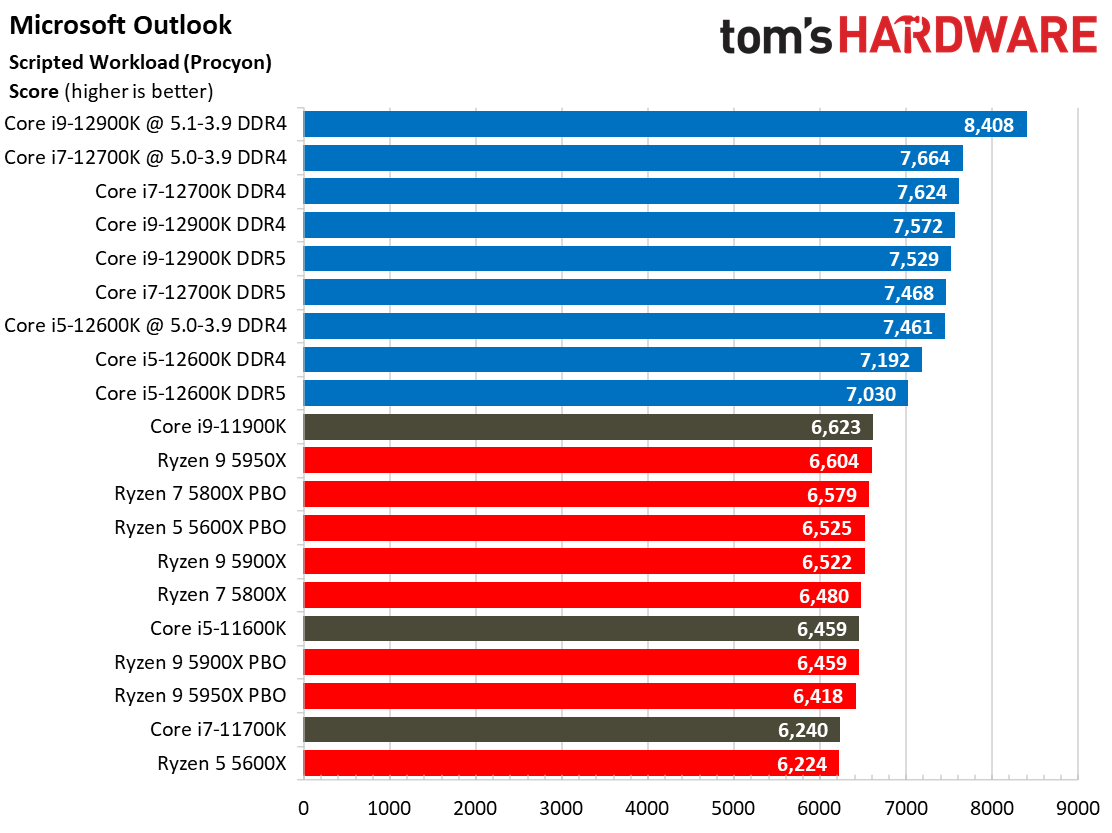
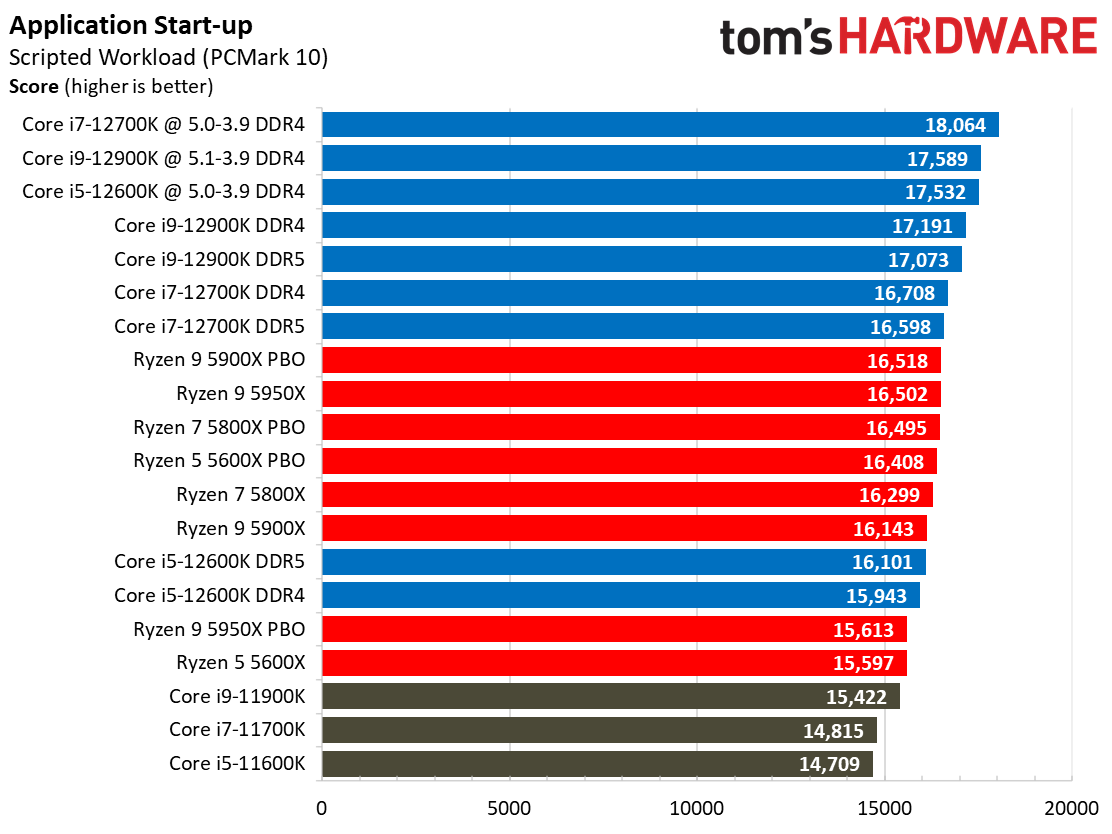
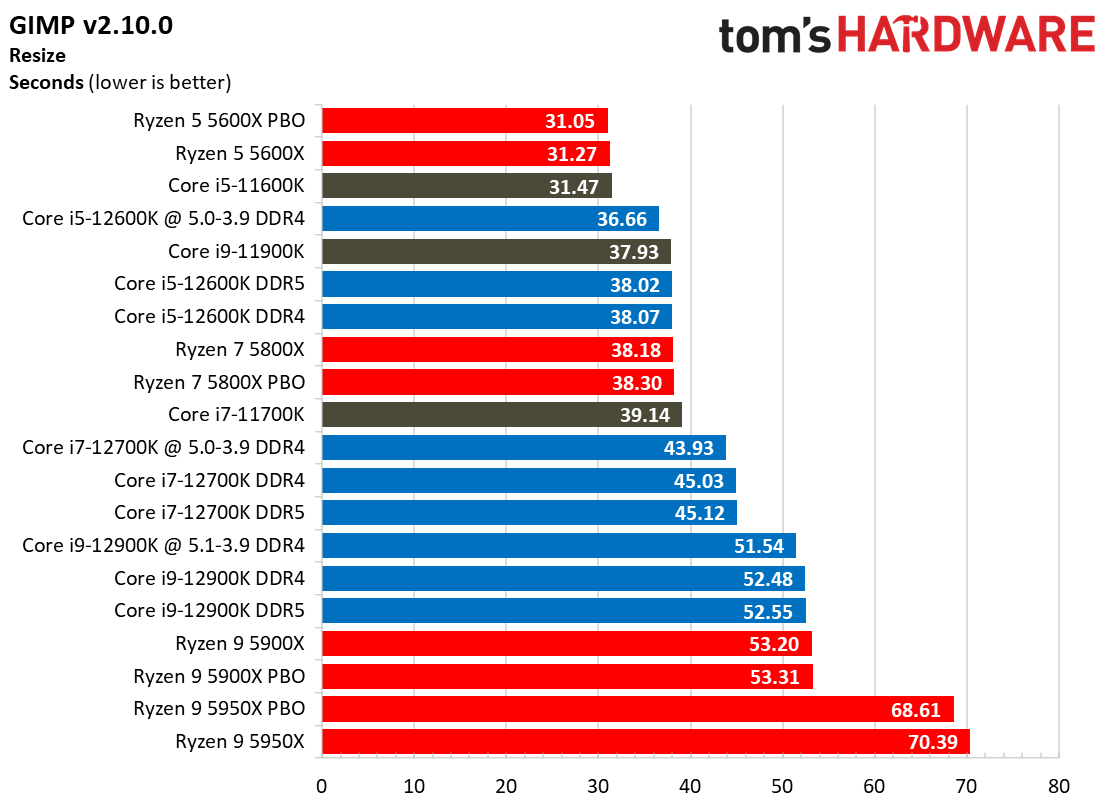
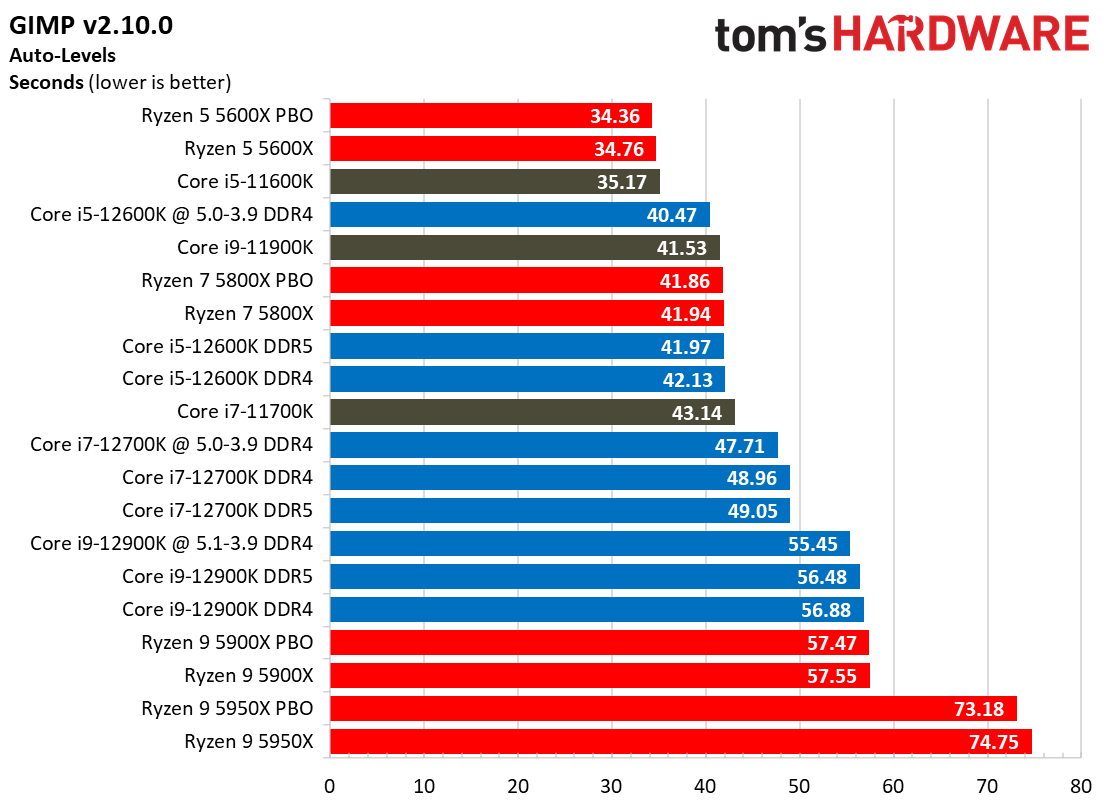
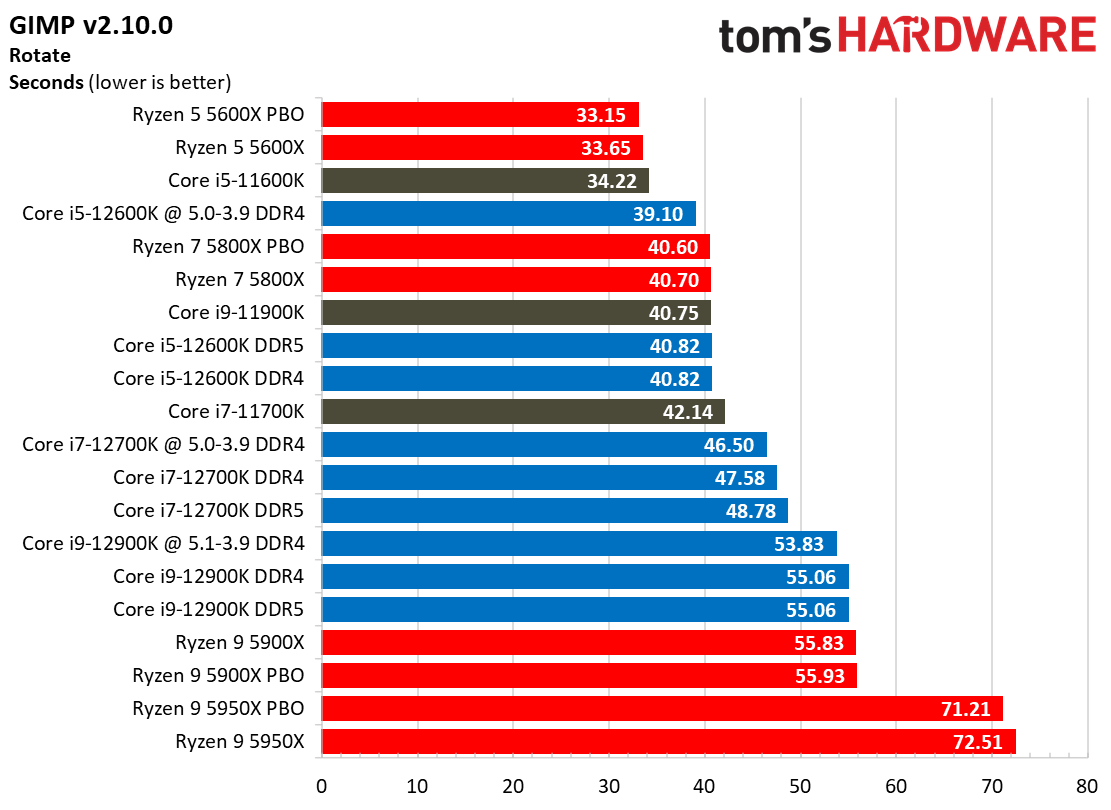
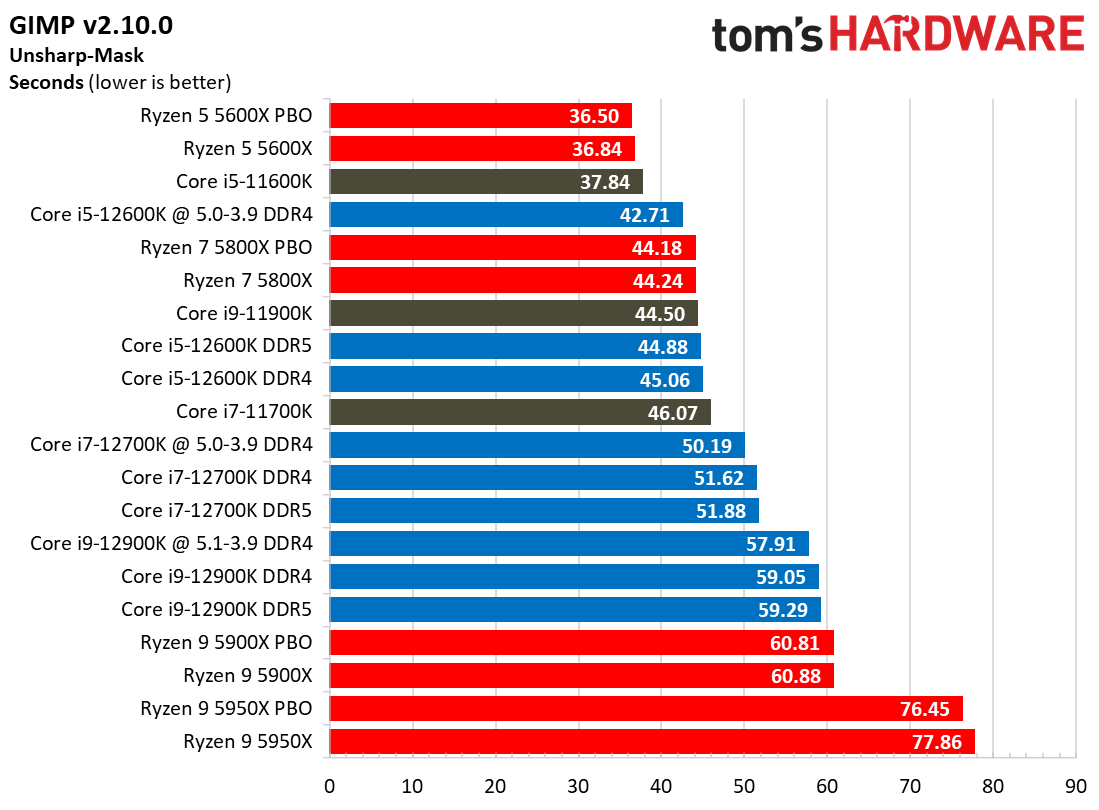
Intel's Alder Lake dominates the Microsoft Office testing and delivers the snappiest application load times. Meanwhile, the Ryzen 7 5800X leads in the GIMP testing, but the 5900X and 5950X trail all other chips in the test pool significantly. Moreover, this condition is repeatable, suggesting that GIMP doesn't scale well with Ryzen 9's additional compute die.
Compilation, Compression, AVX Benchmarks on Core i7-12700K
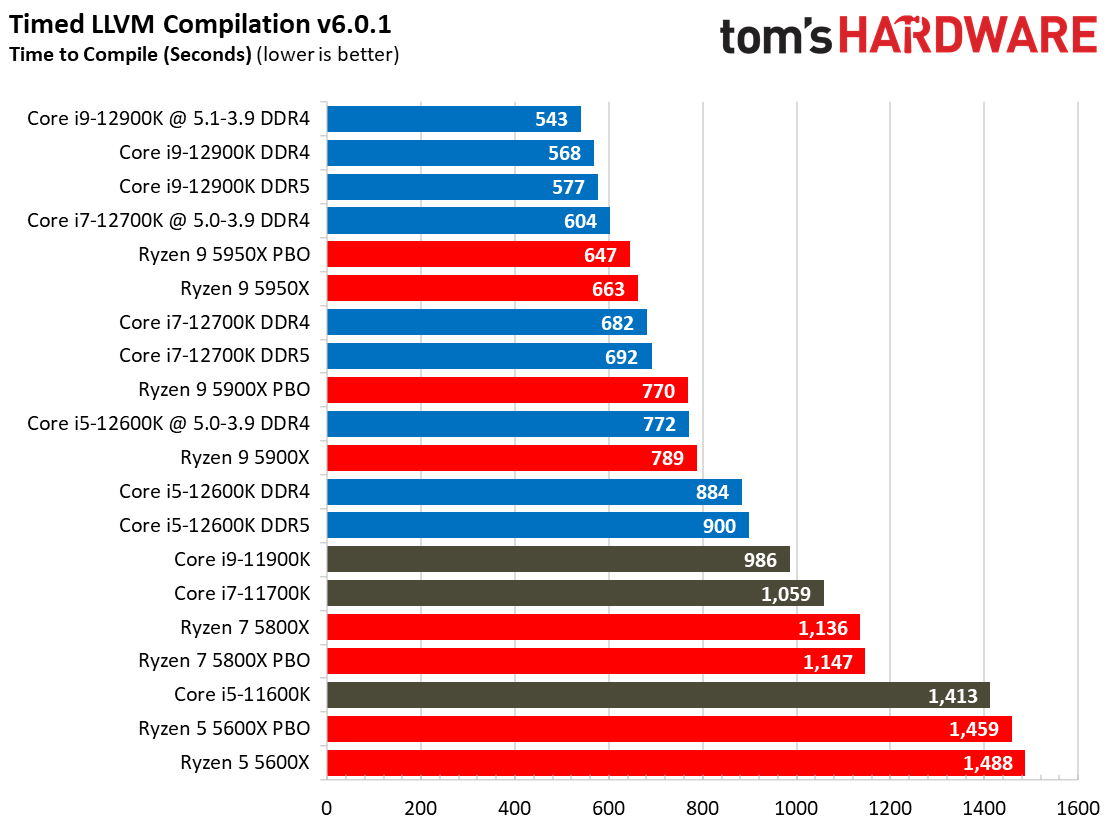
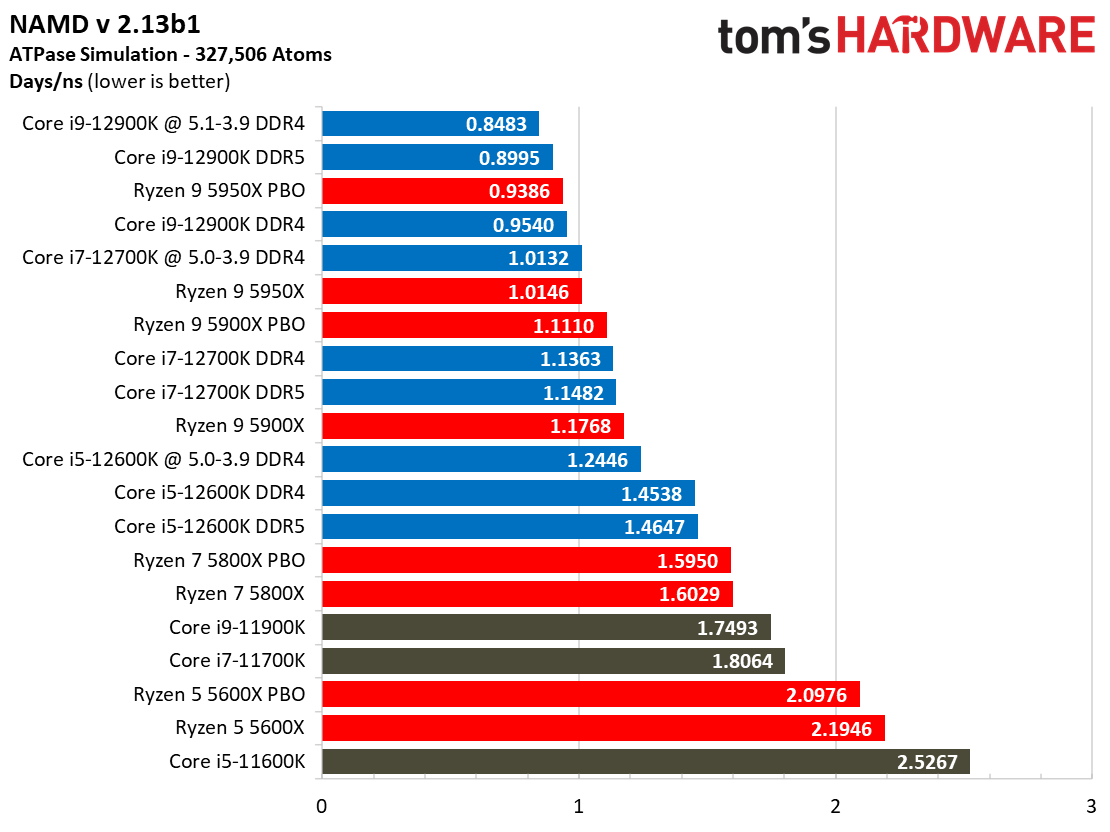
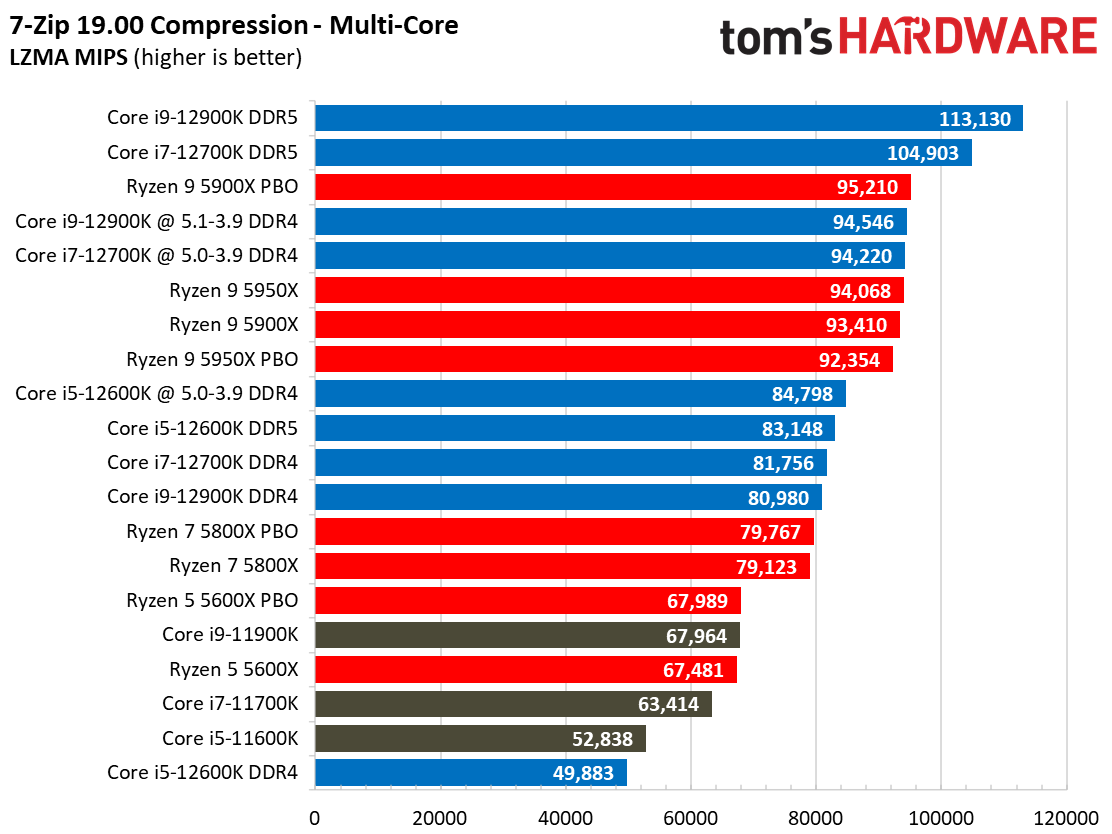
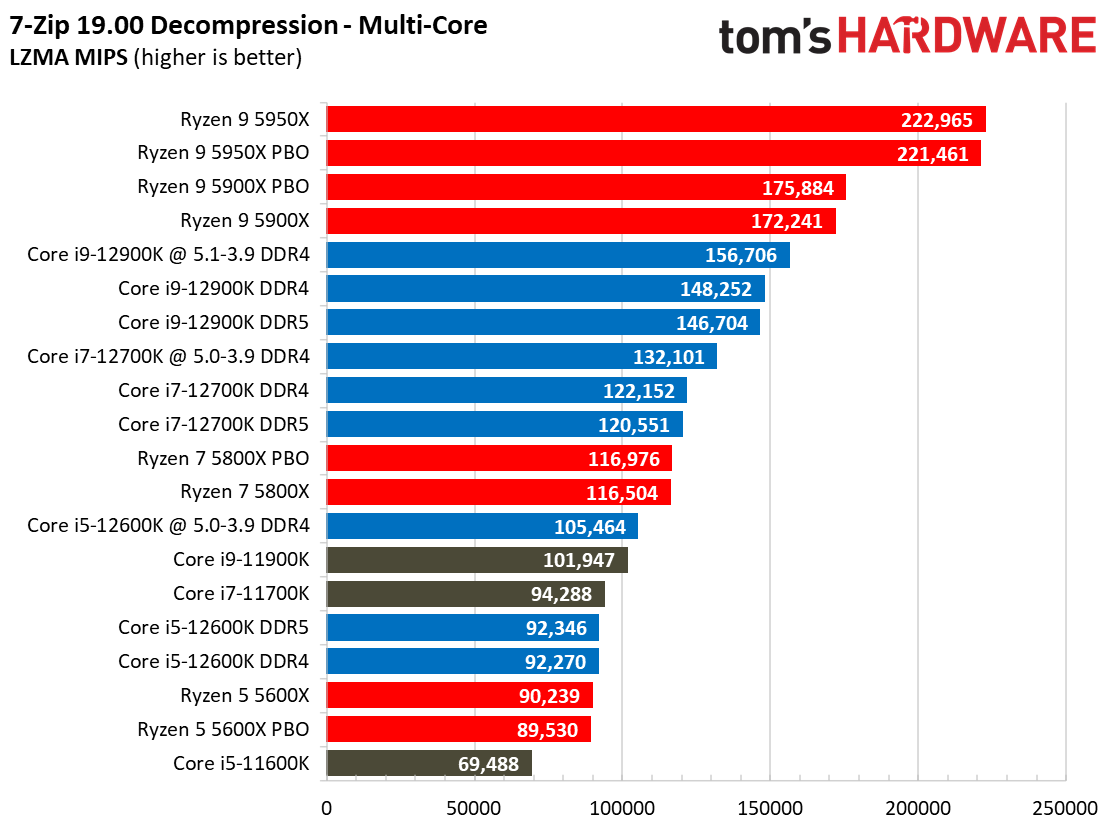
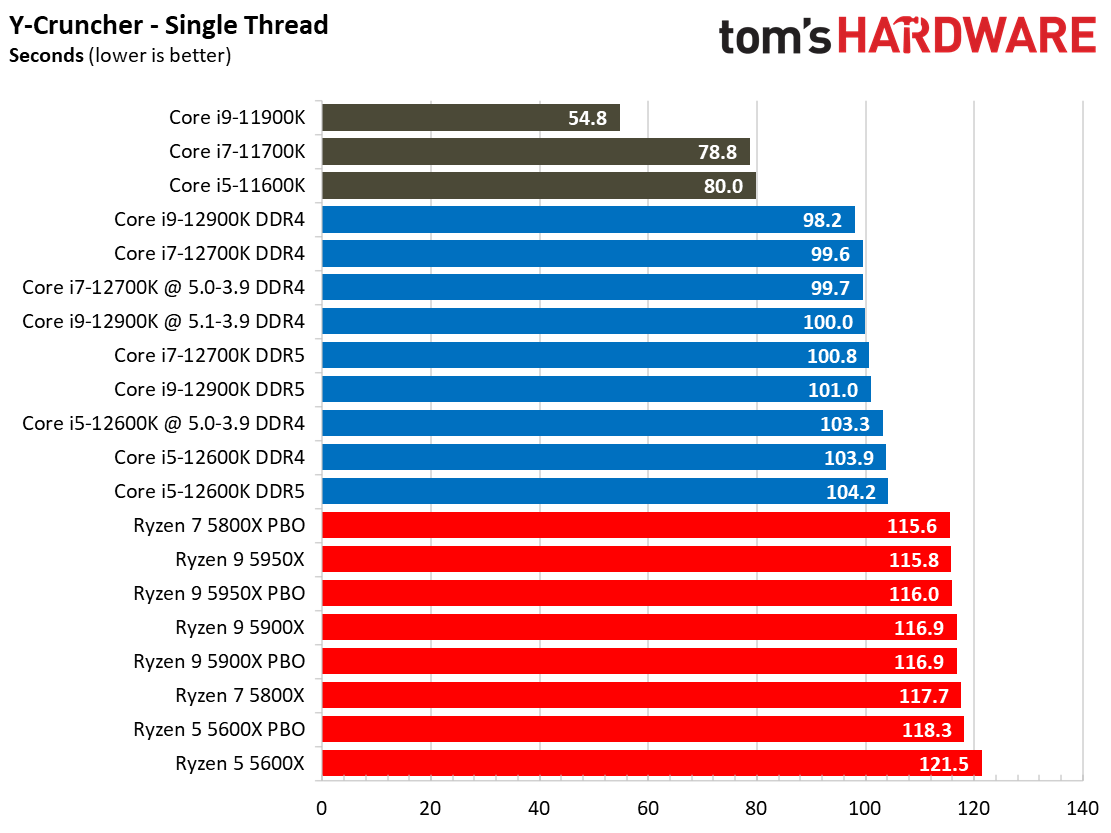
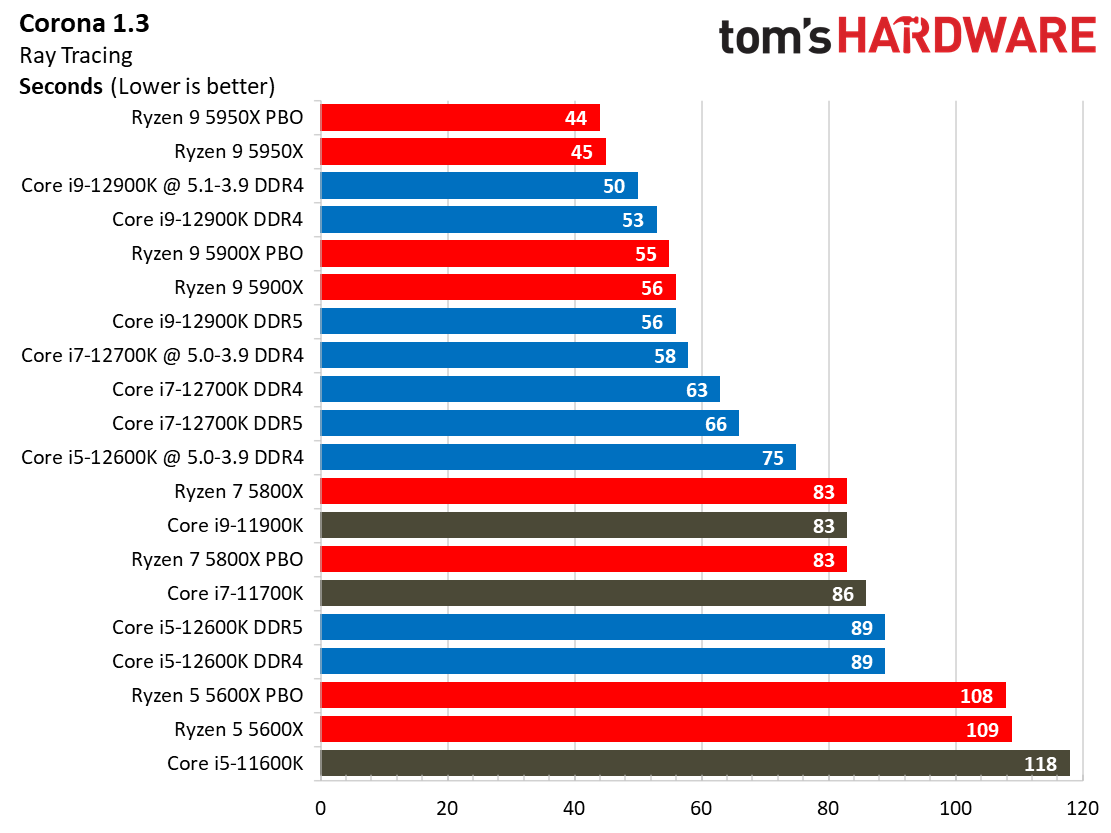
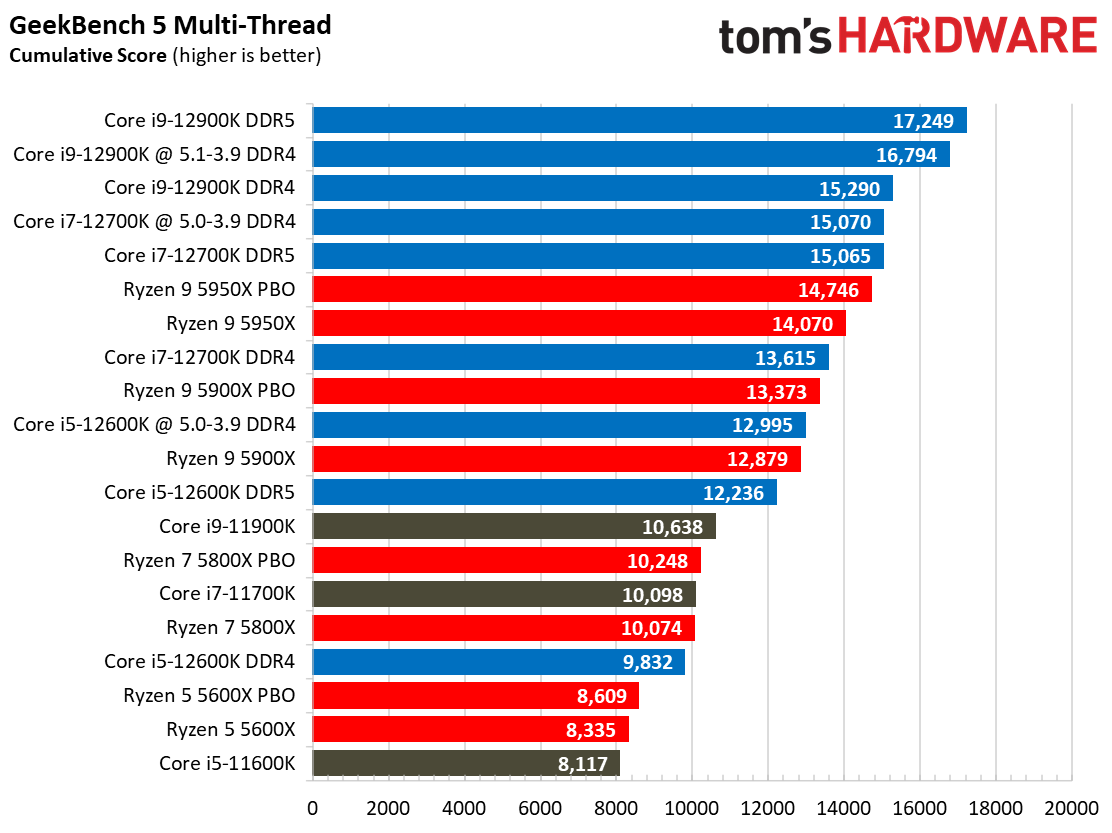
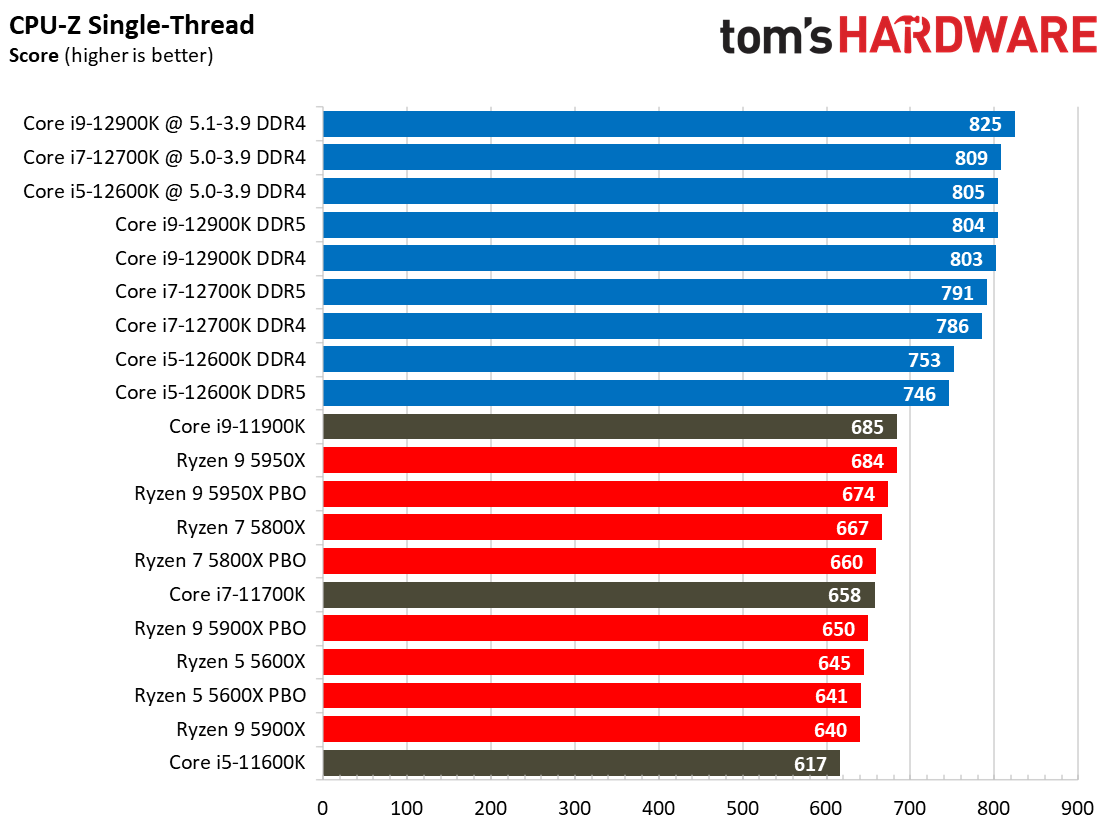
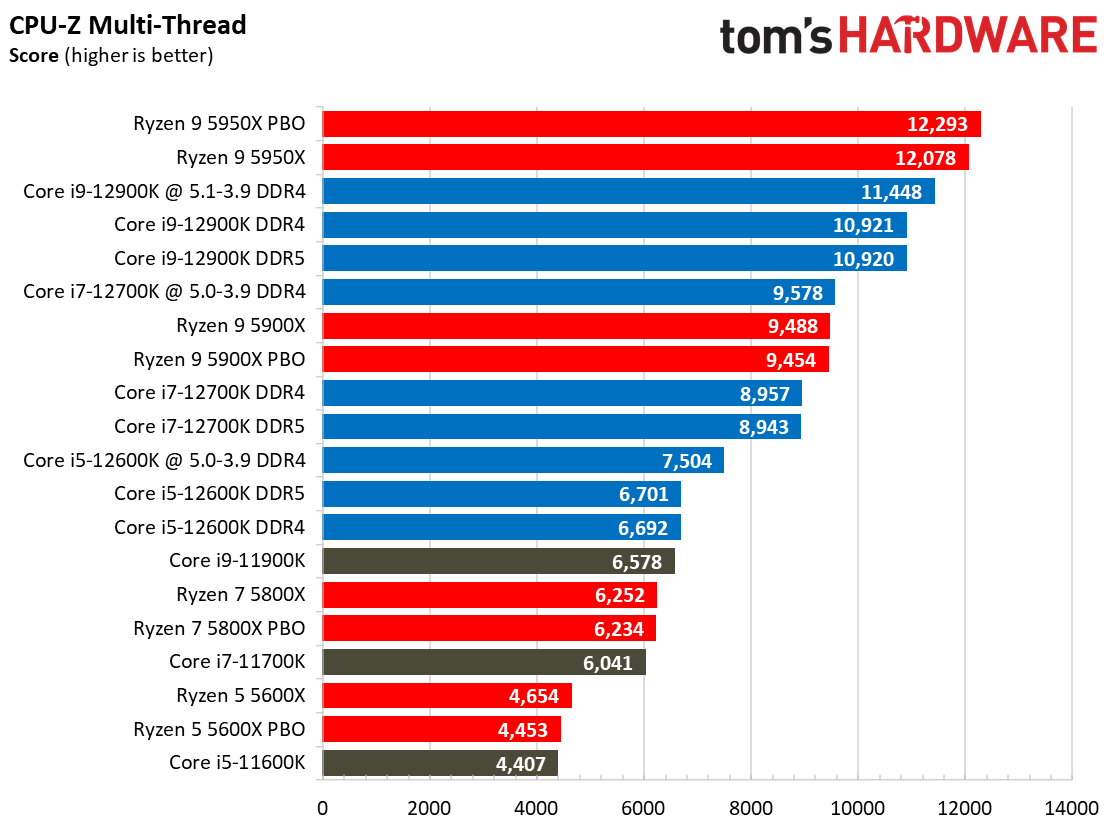
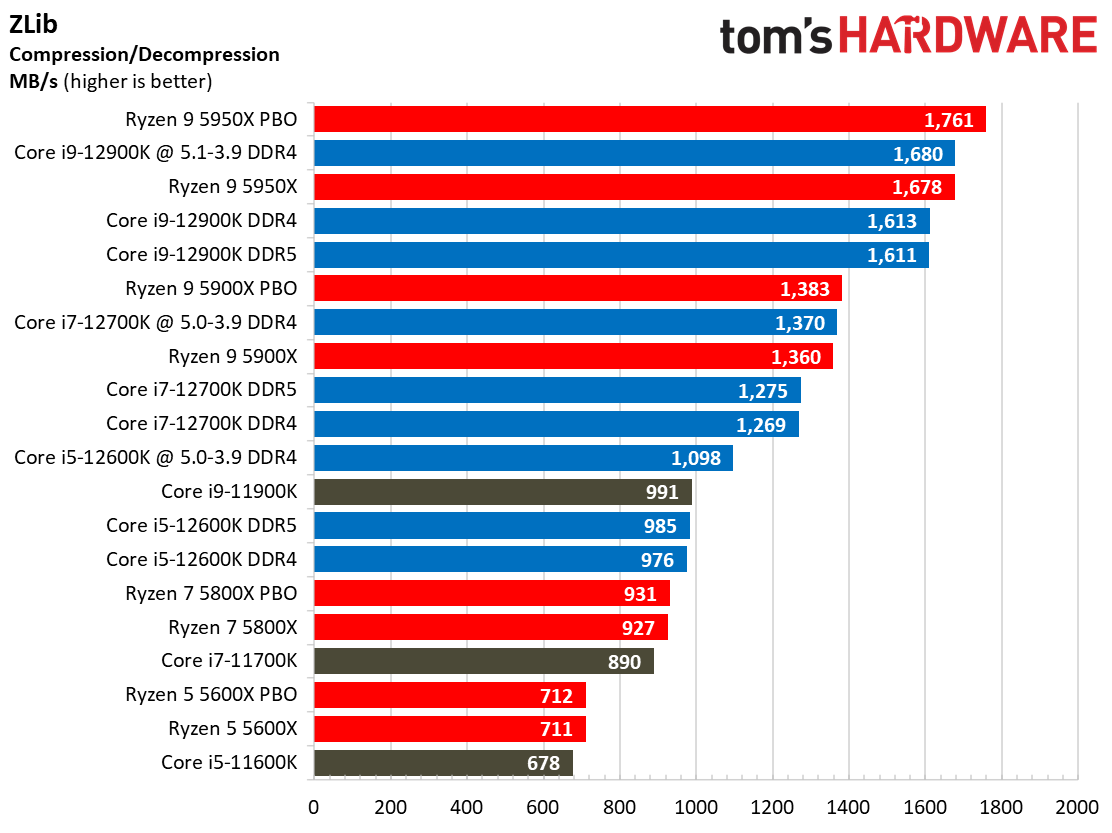
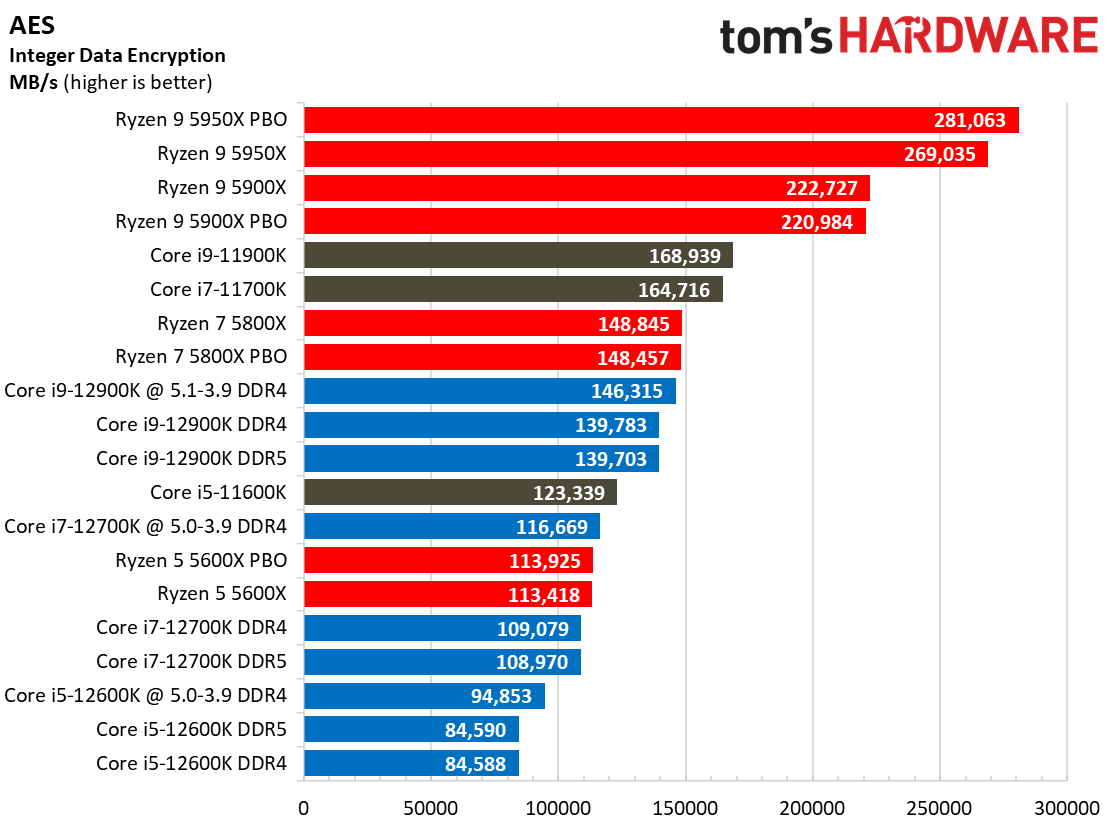
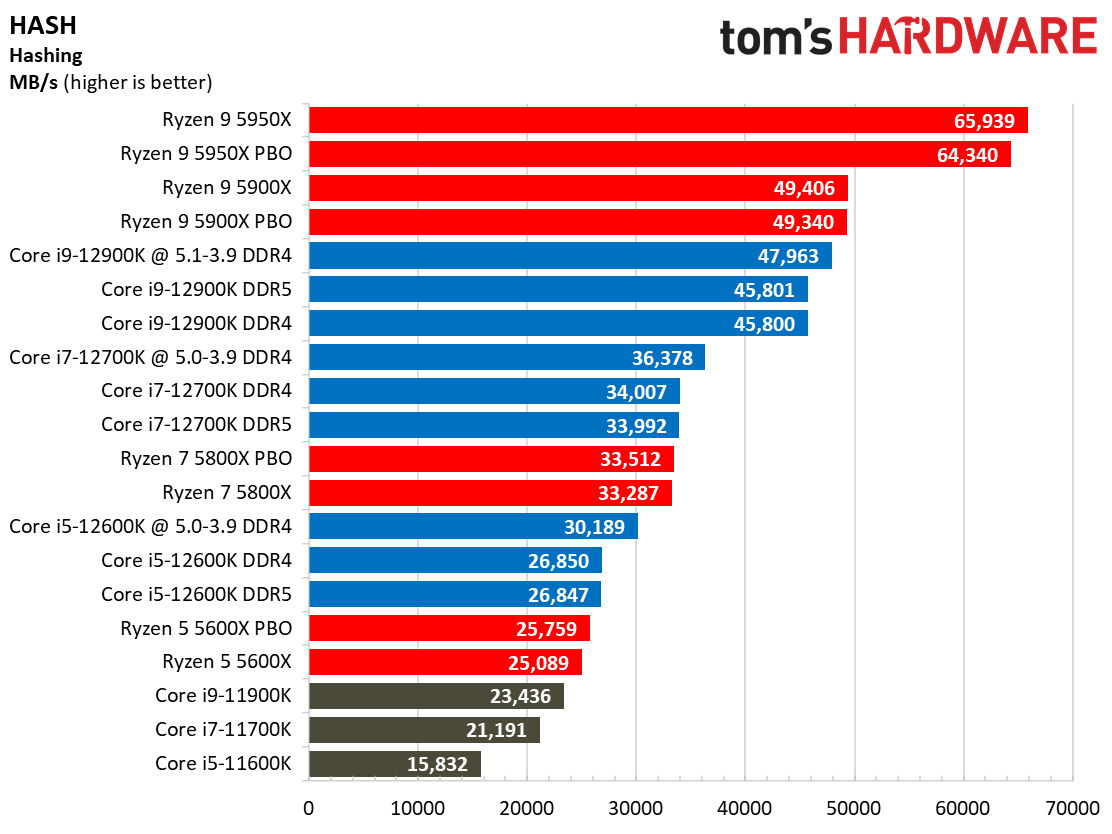
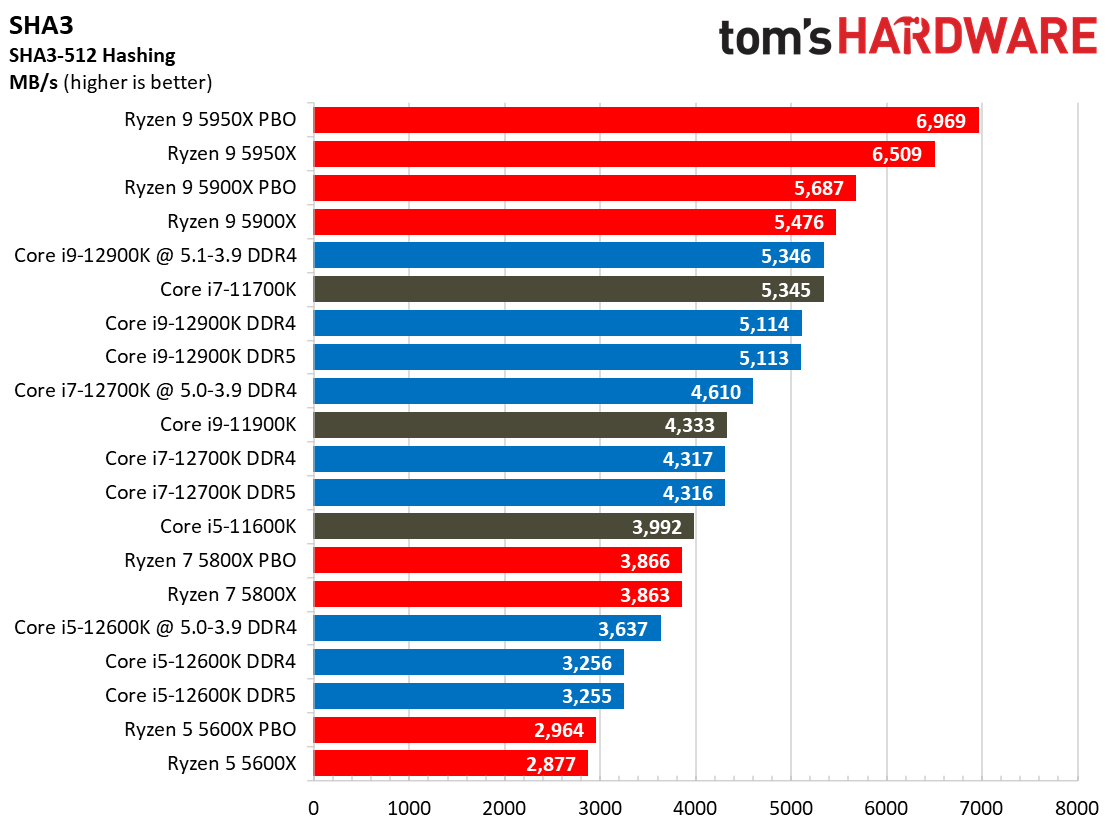
This grab bag of various tests finds Alder Lake notching several more important wins. From the exceedingly branchy code in the LLVM compilation workload to the massively parallel molecular dynamics simulation code in NAMD, the Alder Lake chips impress.
Notably, Intel disables AVX-512 when the E-cores are active, but the increased throughput of DDR5 helps the 12700K beat its AVX-512-equipped Rocket Lake predecessors in some vectorized work, like the multi-threaded y-cruncher benchmark. However, Rocket Lake still keeps the lead for the single-core y-cruncher test, where single-core memory bandwidth isn't as much of an advantage. AMD continues to benefit in the SHA3, AES, and HASH benchmarks from its cryptographic optimizations.
- MORE: Best CPUs for Gaming
- MORE: CPU Benchmark Hierarchy
- MORE: AMD vs Intel
- MORE: All CPUs Content
Current page: Intel Core i7-12700K Application Benchmarks
Prev Page Intel Core i7-12700K Gaming Benchmarks Next Page Core i9 Gaming for i7 Pricing
Paul Alcorn is the Editor-in-Chief for Tom's Hardware US. He also writes news and reviews on CPUs, storage, and enterprise hardware.
-
Soaptrail I like that the summary under the graph for the games average says 12% faster than the AMD 5800 but no one is going to be using a 12700K to play at 1080p. If we go to 1440p the Intel still wins but only by 4% and even then any of these CPU's are all solid choices for gaming. I will give Intel the win but we are splitting hairs on saying it is 12% better at 1080p.Reply